#a vision of her becoming the very embodiment of Mother Nature herself and become the protector of all natural life
Text
So here’s an idea for Rose
What if she was the embodiment of Mother Nature herself? What if she was more then just the violet beast, a former avenger?
What if she traveled to the heart of the earth and truly discovered herself as the protector of all natural life?
Hmm what if indeed
Tags: @astralshipper @arickaandherfictionalothers
#I was thinking of what more could Rose be other than an avenger?#what if she was more?#after the avengers disband after Tony; Nat; and Steve Die#and after the events of multiverse of madness and the loss of her wife#and after her twin boys grow up#Rose in her old age finds herself leaving her home one night#being called to some unknown place#she doesn’t know where she’s going but she’s following the call#she finds herself in the densest of jungles on the planet and when she finally reaches the middle of it she finds and ancient shrine#one of a beautiful woman with long flowing hair#and stood up on a pedestal is a single glass orb#and when Rose touches it#she is given a vision#a vision of her becoming the very embodiment of Mother Nature herself and become the protector of all natural life#after her vision she is transformed and essentially becomes young once more and becomes immortal to forever roam and protect the earth#this is rambling at this point but I hope I get the point across#self shipping#self ship#selfshipping#self ship community#self insert#selfship community#f/o#marvel#mcu#rose stark#Rosemary stark#marvel oc#mcu oc
2 notes
·
View notes
Text
"i shot that bitch when i got the chance"
should amelie strand from death stranding be regarded exclusively with hatred?
or was it the very goal on kojima's part to make a human being bear the unthinkable load of functioning as a system ending a natural cycle dictated by the arbritrary cosmos while retaining human sentimentality and sentience? life is made to perservere and survive and even the extinction bringer would rail against the inevitable a little longer.
"to make sense of everything you need time, you need perspective, and i'm not a line, i'm a single dot."

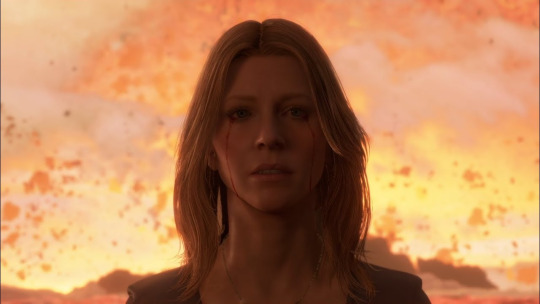
a very popular sentiment even on the official reddit of death stranding, you would see it fairly enough to assume it the general reaction toward amelie as a character, very little space if offered for discussion and understanding of the character's purpose
cumulate it with the fact that her dialogues comes off as "haughty" when kojima intended the original text to merely give her the "unattainable princess" archetype which is how she comes across in japanese more naturally, she is embodying the sun queen burdened with visions, a role with a deeper meaning that does not translate either to the worldwide audience but is ultimately the key to the story
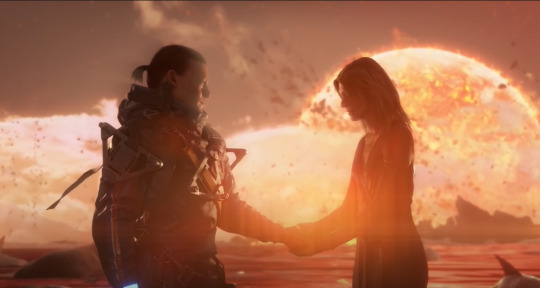
her sins are not accepted by sam nor anyone else from the cast, she is shot at just as bridget, the body without a soul (important) was the one to order cliff to be shot, the absence of being able to transmit feelings in the manner of a human being made of flesh and warmth is what amelie represents, bridget's inability to act as a mother and connect with sam is also reminiscent of this fact, the sheer inability to feel and connect as a human being when you are not only unable to touch anything but ultimately only "living" like the dead, in a different reality than anyone else
the feeling strikes a very particular chord with anyone who has felt this type of alienation, which is why the character of higgs was so willing to be by her side and his inclination to follow her plans and be tricked by her as well due to his own need for control (which is another topic)

the novel also introduces the fact that she saw herself as a child already plagued by visions of the world ending in painful vivid details in a painting of mary holding jesus weeping, knowing she would never be able to avert the death of jesus, only to be here, to witness, amelie had not gave into madness and instead, attempt to prepare the world to fight against it as bridget
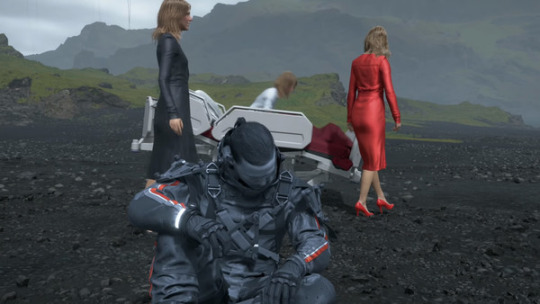
the root of hatred lies in the fact that bridget "has a body, but no soul"
her heart is stuck on the beach in the form of amelie, which made her actions to be devoid of any "heart", in shooting cliff, in the BB experiments, in raising sam at all, in not connecting with him after his wife's death, she is not capable of it by virtue of being, she inevitably becomes a ruthless politician and people like john admired her for her capacity to act upon those goals, the goal of making humanity survive. the person who wants humanity to survive, is the part of amelie that has no heart
which is where amelie enters the scene, as the warmth that sam remembers, and the bringer of extinction, "the hunter's merciful kill"

the interplay of personalities between higgs and amelie is beyond blatant, even more so with a second game, but it also introduces the quiet implication that amelie might have wanted sam to join her side and watch the world end in a "mercy" that if sam was to be by her side, which instead she focused on higgs for this role which directly pit one another in the final waltz (fight)
ultimately, she obtained sam's understanding and had no use for the masquerade to continue by enabling higgs' destructive tendencies any longer, in the end, she shut herself out to preserve the world because it has sam in it willing to go against her, instead of joining her into the void
as long as humanity would not accept "mercy killing" which the homo demens represent, the total loss of belief in the future
amelie was willing deny her own humanity that remains in the possibility of "connecting" by shutting the world out of closing her beach, she essentially "killed" herself so that the world could fight against a natural cycle for a little longer
she made the choice to be crucified as mary, she made the choice to take her son's place, so that he could know love from others instead of her.
the ultimate sacrifice one could do, to leave with love
stranded with love.

15 notes
·
View notes
Text

Nothing really happens in this novel. Apart from one death that is central to the narrative and moves not things, but the state of things along, To the Lighthouse is mainly a patch of stream of consciousness from different points of view. And even this “big event” of this character’s death is merely mentioned, out of nowhere, with no further explanation. Woolf doesn’t care about what happens, only about how something feels. She spends these 200 pages painting a portrait of a bucolic bourgeois scene on the Isle of Skye in the 1910s, with a very faint hue of the First World War happening in the background — “contemplation was unendurable; the mirror was broken. (...) The war, people said, had revived their interest in poetry”.
Woolf paints a picture, just like her Lily Briscoe does for 10 years. This character’s artistic musings seem to embody Woolf’s own: the act of composition, be it of Briscoe’s painting, or of the novel itself, is more important than the final product. The mental process prevails over action: “Some notion was in both of them about the ineffectiveness of action, the supremacy of thought”, she writes.
“Where to begin?--that was the question at what point to make the first mark? One line placed on the canvas committed her to innumerable risks, to frequent and irrevocable decisions. All that in idea seemed simple became in practice immediately complex; (...) Still the risk must be run; the mark made.”
This was my first Woolf novel; so far, I had only read A Room of One’s Own (1929) and her short story “The Lady in the Looking Glass: A Reflection” (1929). I found that her fictional writing is much more complex than her essayistic one, requiring at first a bit of an effort to get acclimated to her abundant use of semicolons and of interior monologue. However, thematically, I was able to find here and there bits of each of these works I previously knew:
In A Room of One’s Own, Woolf critics academia, pointing out its underlying misogyny and invents an abstract sister for Shakespeare, demonstrating how, if the latter had been a woman, she would’ve never had the success that he had as a man. In this novel, these critiques are subtly hinted at here and there: a character states to Lily that “women can’t paint, women can’t write”. Another character asks, “If Shakespeare had never existed (...) would the world have differed much from what it is today? Does the progress of civilization depend upon great men?” and affirms that “the very stone one kicks with one’s boot will outlast Shakespeare.”
The novel also hints at her short story “The Lady in the Looking Glass: A Reflection”, which describes an empty room reflected in a mirror. Both works express a kind of spatial melancholy, painting a scene which brings subjectivity to mundane objects: “how once the looking-glass had held a face; had held a world hollowed out in which a figure turned” (from To the Lighthouse). In both, houses and spaces become characters. The novel is divided into three parts: “The Window”, “Time Passes”, “The Lighthouse”. In the second part, the house itself becomes the abandoned protagonist, as we follow it through the years, empty.
But the passages that stuck with me the most are from the first part, relating to the character of Mrs Ramsay, a mother of eight: “So boasting of her capacity to surround and protect, there was scarcely a shell of herself left for her to know herself by; all was so lavished and spent”. While Lily Briscoe represents Woolf’s artistic vision and a feminist denial of female stereotypes, and while Mrs Ramsay stands on the complete opposite side of this, she does however represent in her resignation the female condition in its most subtle anguishes: “They came to her, naturally, since she was a woman, all day long with this and that; one wanting this, another that; the children were growing up; she often felt she was nothing but a sponge sopped full of human emotions”; “Again she felt (...) the sterility of men, for if she did not do it nobody would do it”. What I also really appreciated was the age of these female characters, since literary representation (specially up until Modernism, one could argue), tends to be drawn to younger women and girls. Woolf, on the other hand, gives voice to the atemporal feelings of mature womanhood: Mrs Ramsay’s age isn’t specified, but we can infer she is a middle-aged woman, while Lily starts the novel at 34 and, by the end of her artistic meditations, she is 44 years old.
Throughout the narrative pervades a consistent inherent longing for things one cannot have: a moment, a father’s approval, a presence, the lighthouse. Considered to be her most autobiographical novel, To the Lighthouse is inspired by Woolf’s family and their holiday house, which explains the pervasive atmosphere of nostalgia for something the reader doesn’t quite understand. Written like an impressionist painting, it feels like a fragment of memory. At the end, the characters disappear, but the feeling lingers: “‘you’ and ‘I’ and ‘she’ pass and vanish; nothing stays; all changes; but not words, not paint.”
#bookstagram#books and flowers#flowers and books#books#book#flowers#literature#blossoming books#virginia woolf#to the lighthouse#british literature#english literature#english lit#a room of one's own
5 notes
·
View notes
Text
"Everyone says Targaryens are closer to Gods than to men." Daenerys Targaryen × the Egyptian Pantheon.
1) The Mother of Monsters
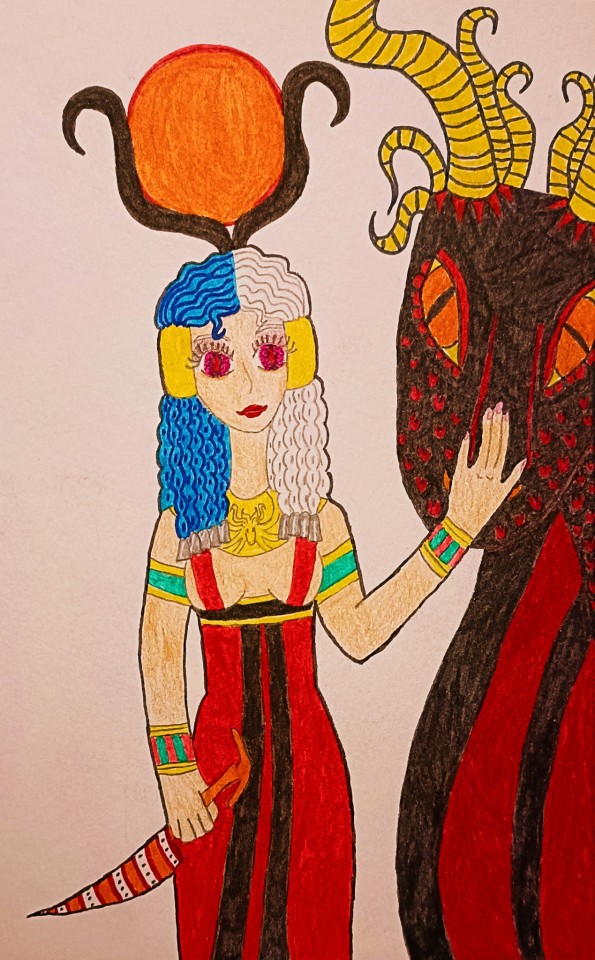
👉 Daenerys, like everyone, has a dark side, maybe literally embodied by her "winged shadow", Drogon (who is savage and disobedient, as well as hungry for children, sometimes) - a dragon she named after her fearsome and brutal husband, a man she loves but who hurt her. To play the game is to play an ugly game - a game of war, of blood, of casualties, of confusions. After Drogo dies, Daenerys becomes a Conqueror Queen and takes Daario Naharis as her lover - and he is a gallant but dangerous man, who asks Daenerys to indulge in her darkest self and her most violent options. Daenerys' birth and rebirth both come through violence and sacrifice : her mother's death and the great storm on Dragonstone, her husband's death and his funeral pyre in the desert. Death and sex (meaning death and love, death and life) are a part of Daenerys' journey, for the better and the worse.
Gods : Seth, desert and storm god / Hathor, goddess of love and childbirth / Sekhmet, powerful warrior goddess and alter-ego of Hathor. Red & black & turquoise as code colors.
Attributes : Sun disk inside of cow's horns (Hathor), knife (Sekhmet), was-sceptre handle (Seth).

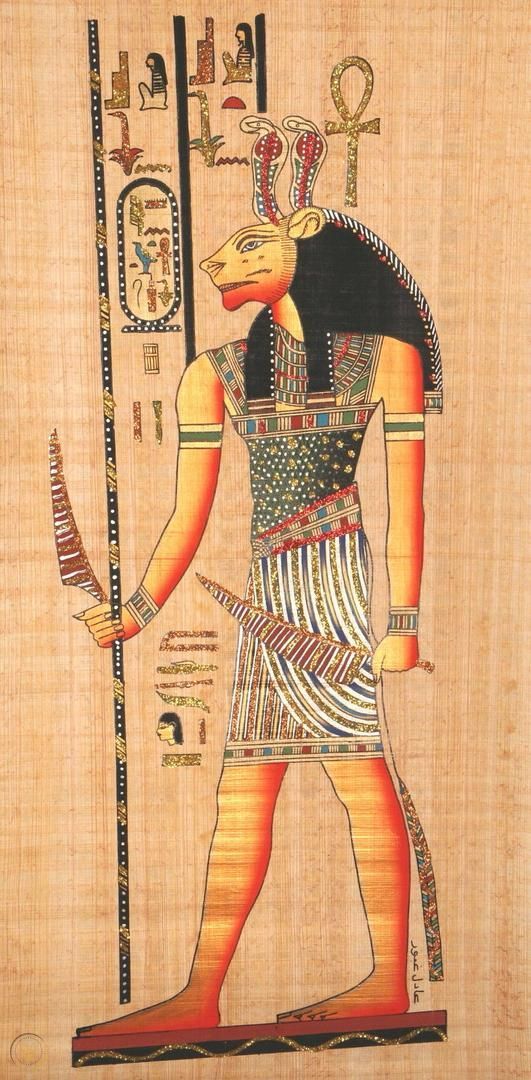
☝️figures : possibly actually Isis on the left but she has attributes very much borrowed from Hathor (the cow horns, sun disk, menat) ; on the right, Sekhmet the bloodythirsty lioness.
2) The Silver Queen

👉 Daenerys and Viserion, her pale sweet child, named after her brother Viserys, IIIrd of his name. A picture of royal power : Daenerys is a Queen, who tries to rule nobly and gently over her subjects. Viserion represents a promise to be everything her brother could not be, to never be seen as weak and pathetic as him, to always be royal in appearance and in character and justly proud, as well as to be a discerning and wise monarch. Daenerys thus wears her three headed-crown in all official circumstances, and exerts herself to be a strong leader, and listens to the wise advice of those around her, and to bring peace instead of war. She intends to restaure a natural cycle of growth and prosperity in Meereen by planting olive trees, a notorious symbol of peace.
Gods : Isis (queen goddess of magic and fertility) / Horus (son of Isis and symbol of kingship ; god of the Sky) / Orisis (undead god of the afterlife, of eternal life and of natural green cycles).
Attributes : the Ankh, the Sun and the moon (Horus' eyes), mixed Heka sceptre/Nekhakha scourge (Pharaoh), Udjat eye (Horus), composite ostrich feather crown (Isis & Osiris).
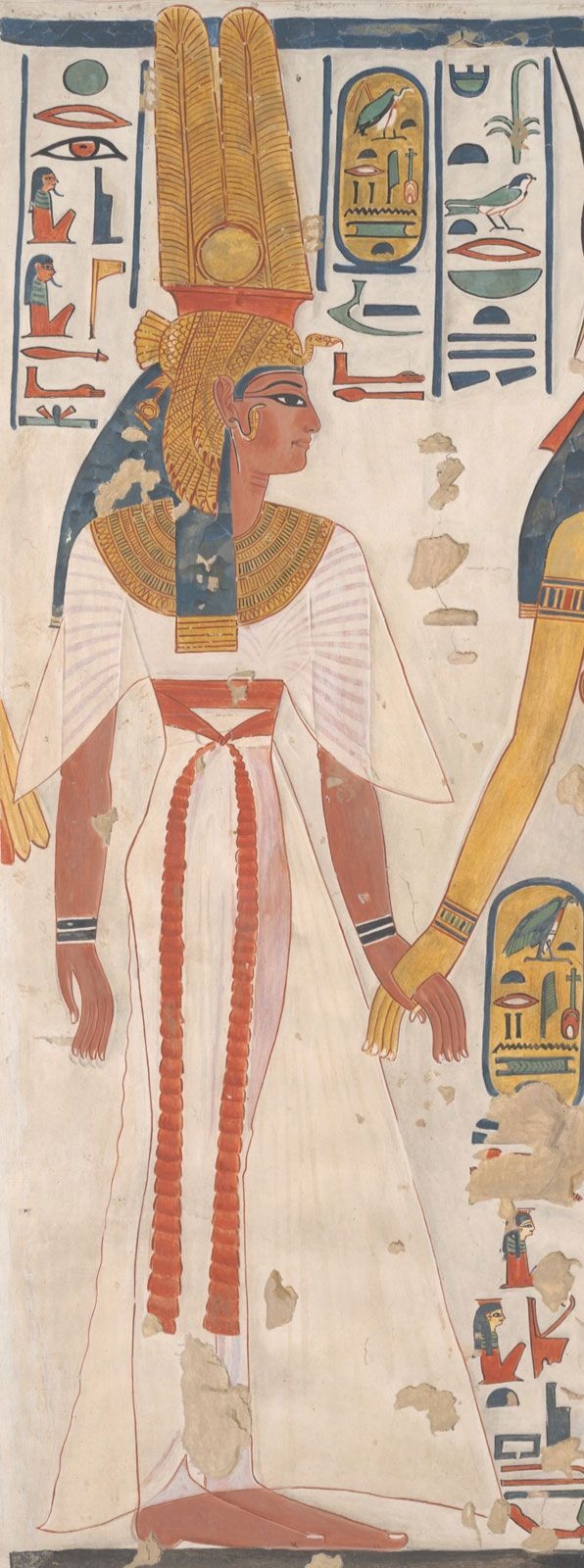

☝️figure on the left is actually Queen Nefertari, but the great royal wife/queen of the pharaoh is often considered to be the incarnation of Isis on earth (used this one here to contrast with the previous look) and shared attributes with her ; on the right, the god-king Osiris.
3) The Slayer of Lies

👉 At her core, Daenerys is a kind empathetic young woman with the drive to do good. She's here with Rhaegal, the dragon named after the brother who died before she was born and to whom she's often compared. Rhaegar represents a model as a prince and as a king who never was - Daenerys often sees gim in her visions, and models some of her actions after her image of him ("it's time to cross the Trident"). Daenerys is an idealist who wants to fight to leave the world a better place than she found it. Daenerys has endured being sold, and slavery, and is at her core, beyond her dragon children and her crown, she is a young girl who has faced hardship and wishes that others would not go through the same things, or to be able to rescue others from them. As such, she is also the Breaker of Chains.
God : Maât (goddess of Justice, Harmony, Peace, Cosmic Order and Balance) + a dash of Osiris (natural cycles - plants)
Attributes : the Feather of Maât (symbol of purity and tester of goodness).
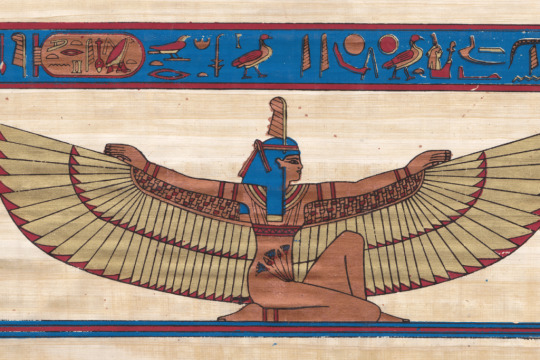
☝️ a representation of Maât.
#egyptian daenerys#daenerys stormborn#asoiaf art#valyrianscrolls#house targaryen#fanart#daenerys targaryen#asoiaf#hathor#seth#sekhmet#isis#osiris#horus#egyptian mythology#the mother of dragons#the mother of monsters#the silver queen#the slayer of lies#the breaker of chains#maat#targaryens are closer to gods than to men
5 notes
·
View notes
Text


Name: Zehra Bishop
Age & Birthday: 27 years old, February 5th
Gender/Pronouns: Cis Female / She/her
Species: Werewolf
Birthplace: NYC, New York
Industry: Pharmaceuticals
Positive Personality Traits: ambitious, resourceful, resilient
Negative Personality Traits: entitled, cynical, impulsive
ABOUT
Zehra's life, on paper, is one of privilege and success. But a closer look at her upbringing perhaps explains the cynical and impulsive woman she is today. Her life started from one out of two scenarios. One of them is that Roderick charmed Alara, swept her into a whirlwind romance which fizzled away into nothing by the time Zehra was born. The other is that Alara knew of Roderick's reputation and how, by the time their relationship began, he already had a host of children all prepped to continue the Bishop legacy. Zehra knows which one she thinks is true, but neither are great options. Either her father is careless with other people's hearts, or her mother knew what kind of man he was, what kind of life awaited their child and didn't care.
Zehra has always longed for deeper connections in her life. Not just with her father and mother but with her brothers and sisters. However, she feels that by the very nature of their upbringing, they're forced into a rat race-esque dynamic without being able to control it. All of them were born with one very particular vision in mind, a security blanket for GenCorp's future. Sometimes, it's as if they're not even people but assets. Even if Zehra wishes to find more meaning to her life, she has been a dutiful member to the machine, joining the company once she graduated college and has worked within the sales department ever since.
She knows that her responsibilities will change and grow as she gets older and Zehra has every intention of handling them all as they happen. But it's become evident that she throws herself into work as a way to forge a better connection with her family. When she's not embodying what it means to be a Bishop, Zehra feels as if she's floating through life without a single clue about herself. Often leading her to impulsive decisions, all in the name of finding something that feels real.
0 notes
Text
When someone toxic needs a friend
I just wanna add a little personal reflection to the discussion of Spinel’s treatment in Steven Universe: The Movie.
A few signposts so you know where I’m starting with this:
A criticism I’ve seen:
Steven was not particularly warm to Spinel. He did not hug her. He did not offer to be her friend. He spoke carelessly and triggered her toward becoming murderous again. He only cared about what she could do for him.
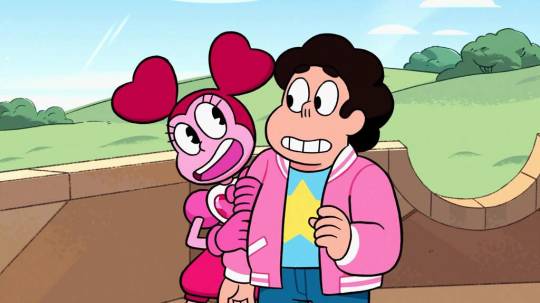
A perspective I’ve seen:
LOTS of people with borderline personality disorder or strong feelings about abandonment personally relate to Spinel and are critical of Steven from this perspective.
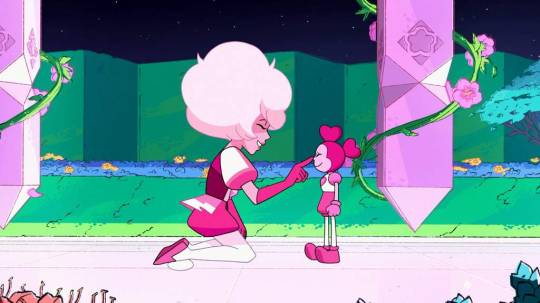
Rebecca Sugar’s commentary on Spinel:
The thing about Spinel is that she’s a really toxic person.
She’s so toxic that she’s literally trying to poison people.
In my interactions with friends who have had a history difficult enough to make it hard for them to trust other people and sometimes even actively want to hurt others, it’s just a very difficult situation to navigate. In the case of Spinel and all of these characters, that’s extremely exaggerated because cartoons have the ability to be extreme exaggerations. I wanted to explore what it’s like when you’re trying to help someone who really doesn’t want to help themselves, who wants to embody the negative feelings that they have about themselves. I think that’s something really real. I hadn’t seen that in a cartoon before.
Spinel, unlike many other characters, actually has the goal of hurting people, which is new territory for the show. She really wants to hurt Steven, and there’s a reason that she does—because she’s in so much pain. I just wanted to explore all the dimensions of that.
I also think Steven has his way of trying to handle and dissolve conflict. It’s not necessarily a good way for him to handle this situation. It really leaves him in a difficult state, and I think what I wanted to show in the way that they interact is that at a certain point, when you can’t help someone, you have to be able to protect yourself.
Ultimately, he can’t really convince her to change. It’s something she’ll have to want for herself. But what he can do is protect himself from her, making it impossible for her to hurt him.
It’s sort of up to you if you would like to love her. If you watch this movie and she, you know, frustrates you, that is totally fair. I want that to be a big part of who she is.
[From the AV Club interview]
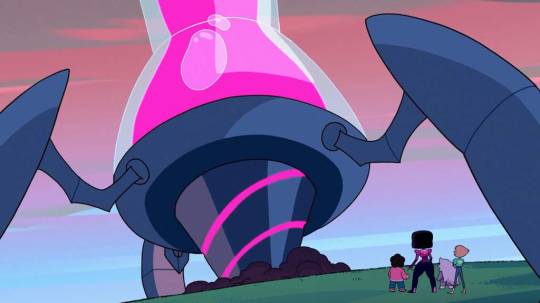
So here are a few things I want to shed light on.
It’s very interesting that Rebecca intended Spinel to be read as “a toxic person” because so many fans fell in love with her, said they’d be her friend, hated intensely on Pink Diamond because of what she did to abandon the poor Gem, and sympathized with her directly. But Rebecca was looking at Spinel from Steven’s perspective. And that’s also what I did.
I’ve been Steven. I have VERY much been Steven.
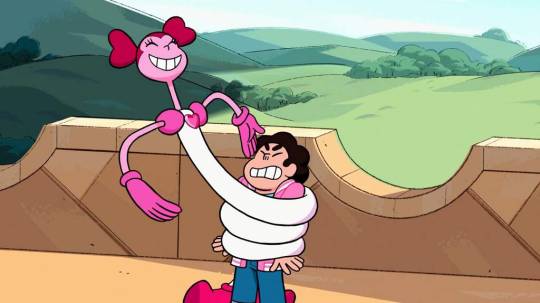
When you meet someone who was done dirty, when you recognize the horror they’ve been through, when you see how much pain they are in and agree they have the right to be angry, it’s natural for empathetic people to offer themselves as comfort.
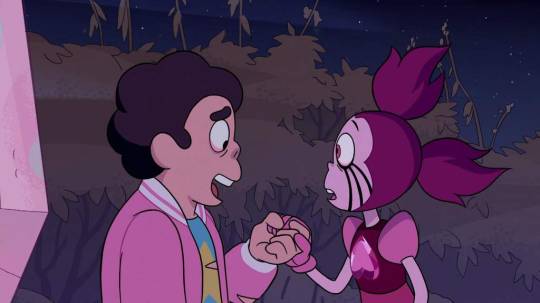
But when you’re Steven, you also know it isn’t YOUR fault either. Before you have the ability and experience to set boundaries, you can get sucked into other people’s stormy waters and think you’re helping if you drown in solidarity with them. What’s really important to preserving yourself is learning that you can stand on the boat and toss a life preserver. That it doesn’t ACTUALLY HELP to jump in the water and sink with them.
Some folks are angry that Steven didn’t jump right into sacrifice himself on the altar of friendship in the service of an intense, literally murderous stranger who tried to poison him and his planet and lash out at his friends, robbing them of their rich pasts and their relationships because all of it hurt HER so much. It is SO easy to understand WHY SPINEL WAS ANGRY. But nothing she was doing to Steven, his friends, or the Earth was going to fix her problems, and furthermore, she FULLY UNDERSTOOD that it was NOT THE FAULT of any of the people she took her anger out on. It was irrational, yes, and that is part of her dysfunction. But also, in these situations, what helps explain it still does not excuse it.
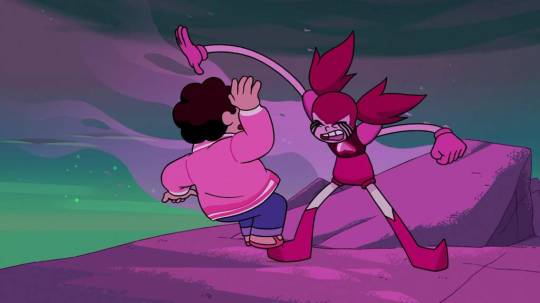
Some have railed at Steven saying he somehow forgave genocidal tyrants like the Diamonds but couldn’t be friends with a damaged Gem like Spinel who just wanted friendship. The big difference there is that Steven got involved with the Diamonds when both parties believed he was a different person. The Diamonds believed he was the lost Pink Diamond, and Steven has also spent much of his superhero life believing he WAS his mother and was therefore obligated to accept punishment for her crimes or to clean up the messes she made. Now that he knows he is not her and that she did some pretty horrible stuff, he also wants the right to stop feeling responsible for every person Pink hurt in the entire region of space.

Steven gave Spinel basically compassionate treatment. He did not abuse her. He did not insult her. He occasionally coddled her when it seemed important (and though some said he was too businesslike while he pursued his mission, he was literally looking at the world ending within two days if he didn’t solve the problem). And most importantly . . . .
He let her leave the garden.
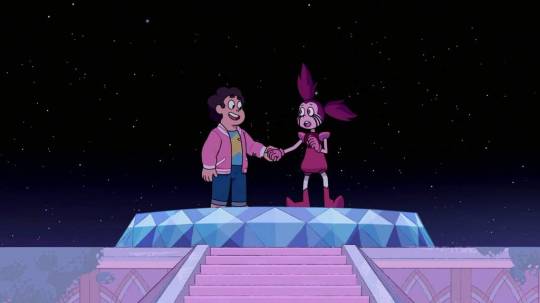
Spinel stayed in the garden all those millennia because Pink Diamond told her they were playing a game. All that time, she had visions of Pink returning so she could see her smile, hear her laughter. We see a sequence where she tried to follow Pink out of the garden and Pink manipulated her into staying willingly. We watch those feet leaving and one pair of feet staying behind. We see Pink disappear.
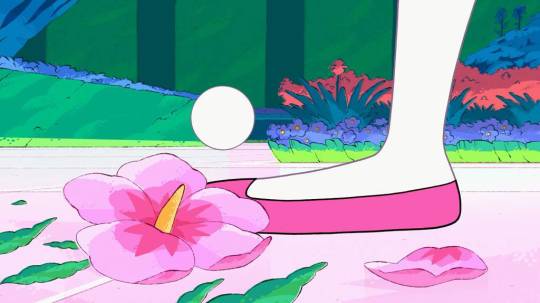
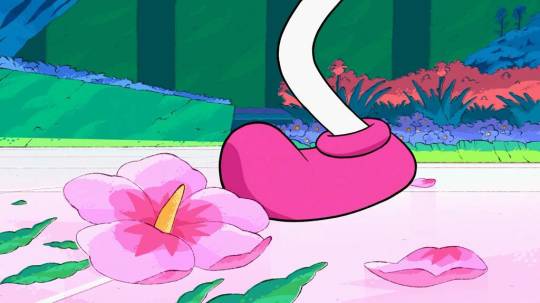
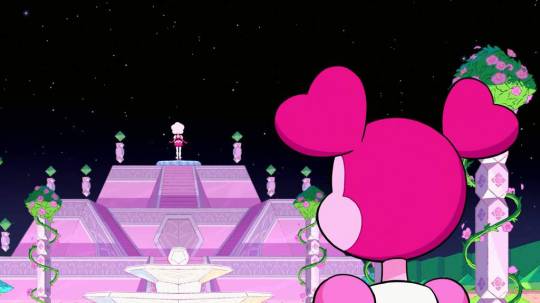
When Steven goes to leave the garden, Spinel follows in the same manner. Some have criticized him for letting go of her hands.
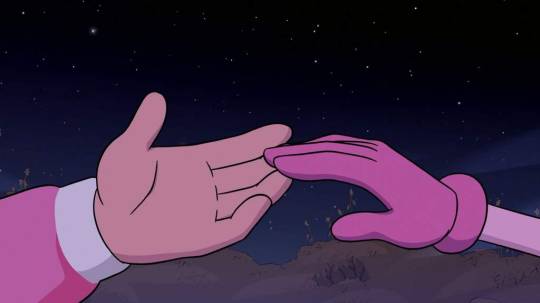
But he invited her out of the garden. He didn’t say stay. He said come with me.
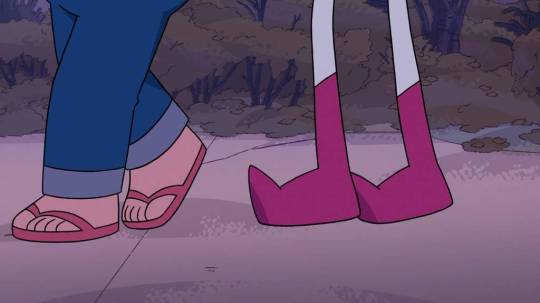
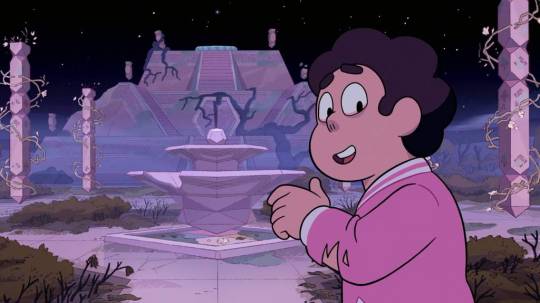
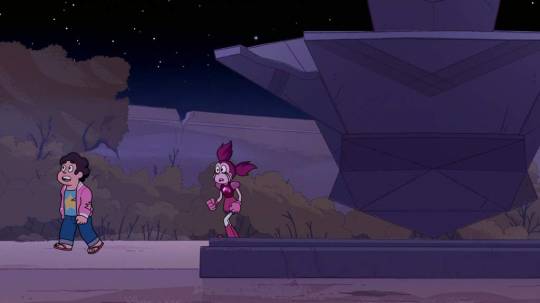
As he sang about her deserving someone better, he was sincere. But he did not say the person to make her feel found should be him. He did not want to take on another person with thousands of years of baggage who would require a specific brand of attention and so much tenderness to avoid snapping. He did not allow her to be held by the hand and led out. He recognized that she needed encouragement to leave this place because of what was done to her, but he wanted her to take the steps.
Compassionate people are crushed all the time under the weight of needy people who make it hurt to love. People like Steven can acknowledge that Spinel deserves love and deserves to be happy without accepting that it’s heartless to stop short of personally doing it. Especially when you literally have to take physical, mental, and emotional damage as a general consequence of offering support and counseling. It is sometimes just beyond what you can do.
I made the mistake several times of getting very close to someone who treated me poorly while taking comfort in my presence. I cared that they were hurt and I didn’t know how to say “You deserve love” without stepping in and loving them. In EVERY case I was involved with, the person went from initially grateful to “why don’t you help me more?” shockingly quickly, and two of them deliberately tried to create situations where I would be trapped with them and isolated from others.
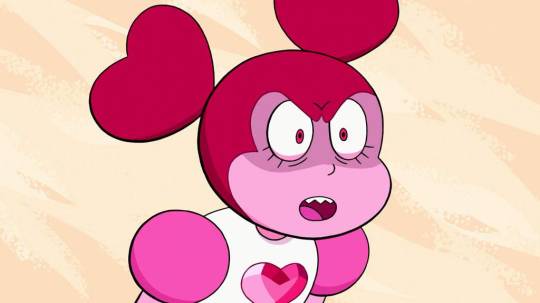
I could get very personal here but I don’t think I need to. Those of us who relate all too well to Steven wanting to help others will have been in this situation. Your heart hurts for people who live with pain that has never touched you, but when they’ve made it clear with one of their first actions that they feel satisfied at the idea of ruining your life, trusting them could mean the end of you. Especially if they demand that you risk life and limb to fix and save them before you’d dare to call it love, and especially if they want to be fixed without feeling responsible for initiating any of it. Some people mistake suffering for working hard toward a goal. Both can hurt but only one is constructive. If I’m expected to spend extensive resources on someone, I need some partnership in the goal, and I can’t accomplish that with someone whose wish for companionship manifests as “I want you to feel as bad as I do, and will take steps to hurt you so I have someone to cry with.”
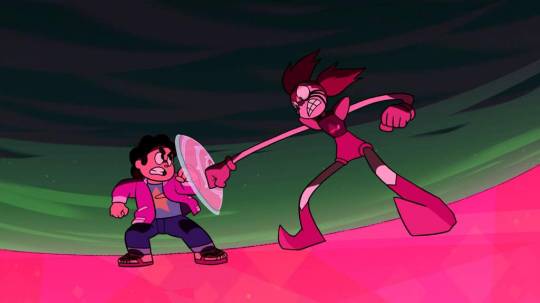
Steven risked his actual life while he didn’t have powers so he could go talk to Spinel, and he wouldn’t fight her when she wanted to fight. He protected himself while she spent her anger. He STILL put himself in the line of fire far more than a less compassionate person would. He took time and tenderness to listen to her story and sympathize with her, tell her she deserved better, bear witness to what she’d become after being treated like a discarded plaything, and bring her hope with promises of a new future and a way to feel found.
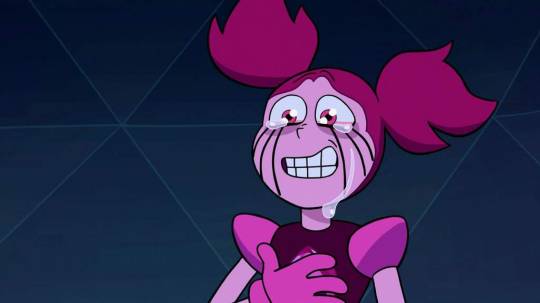
Sadly, Spinel flipped back to being murderous at the first sign that Steven might be about to prioritize someone other than her, reframing his reasonable needs as if he was planning to abandon her, isolate her, discard her. This was a trauma reaction, yes, and she isn’t entirely to blame for being upset because she was worried she was just being used and none of her actions were logically thought through.
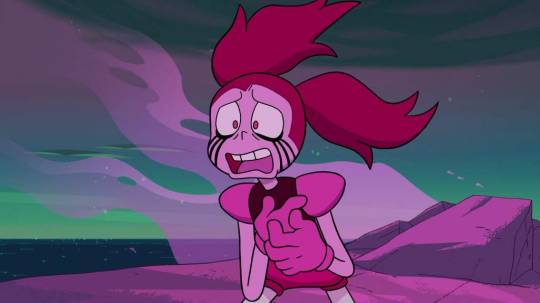
But does someone ever “deserve” the friendship of a specific person who can’t feel warm toward them because of their OWN bad experiences?
No!
Steven has a big heart but he has his very own huge storehouse of trauma, and being physically attacked with his family and planet put in danger over the actions of his mother is at the top of the list. Instead of assuming that the person who has trauma the loudest is the most hurt, can’t we just acknowledge that Spinel’s and Steven’s respective traumas make them NOT the best match for friendship?
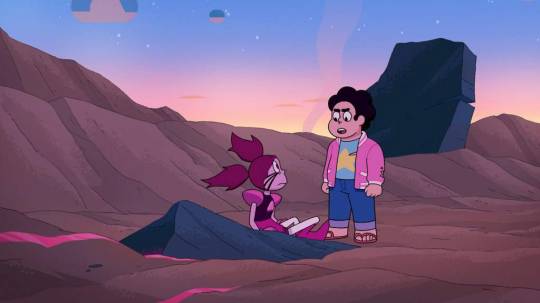
The ending of the movie, with Spinel going off with the Diamonds, might seem a little disturbing with all the codepencency floating around there, but if you want to talk about compassion, I think this is a good place for Spinel to start.
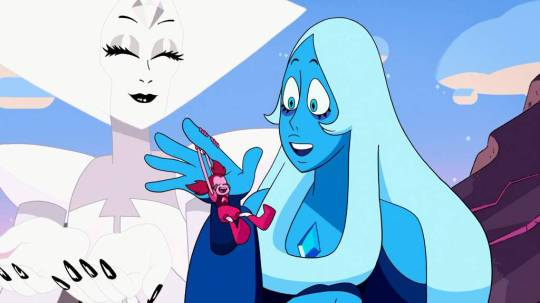
She just wanted to make Pink Diamond laugh and enjoy her life. She longed to do that for so long and then it all ended when she found out she would NEVER GET TO DO IT. I think bonding with the other Diamonds and having a familiar, safe place to experience the kind of love she’s used to will be a good FOUNDATION for building herself into a person beyond that. For now, she needs comfort. I hope they treat her well.
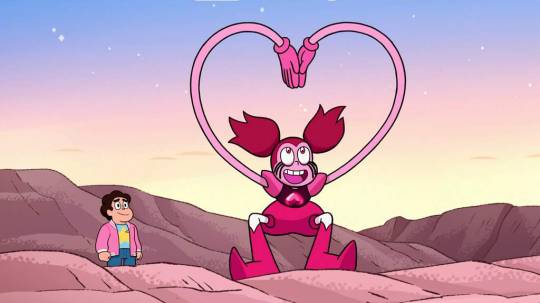
42K notes
·
View notes
Text
spike, angel, buffy & romanticism: part 3
part 1: “When you kiss me I want to die”: Angel and the high school seasons
part 2: “Love isn’t brains, children”: Enter Spike as the id
*
“Something effulgent”: Season five and the construction of Spike the romantic
Prior to becoming a romantic interest, Spike is everything I discussed in the last section. He is an id and a mirror for Buffy, he’s prone to both romantic exaggeration and cutting realism, and his liminality suggests ambiguity. But outside of “Lovers Walk”, the writing doesn’t actually delve too deeply into Spike’s nature as a romantic. If you stopped the canon at “Restless”, you’d probably think that Spike’s love for Drusilla was intriguing, but that the show hadn’t really gone anywhere with the implications of it, and for all you knew, that might not be an important part of his character anymore. So one of the most interesting things about season five to me, is that in this season in which the writers first consciously, deliberately decide to explore the sexual and romantic tension between Spike and Buffy, they also emphasize Spike’s romanticism more than ever. The choice to define Spike by his romanticism is a choice that follows naturally from everything established about his character, but it was also not an inevitable choice. Therefore, it’s a choice worth looking at in some detail.
Consider everything that “Fool For Love” establishes about Spike, especially the things that contradict what was supposedly canon at the time. It makes Drusilla his sire instead of Angel, meaning that he is sired by a romantic connection, and as a direct result of heartbreak. It makes him a poet living in the middle of the Victorian era, an age at odds with his previous ages of “barely 200” and “126”. Meaning that the writing specifically decides to ignore its canon in order to associate him with an era in which passions would have been repressed (rather than the Romantic era of the early 1800’s or the modern energy of the early 1900’s). Moreover, the episode reveals his entire aesthetic and personality to essentially be a construct. But most tellingly of all, it reveals him to be an idealist. Spike is not just a performance artist; he yearns for the “effulgent”, for something “glowing and glistening” that the “vulgarians” of the world don’t understand. In other words, he yearns for something bigger and more beautiful than life: something romantic. Later, he chases after “death, glory, and sod all else.” Spike may be a “fool for love”, who has a romantic view of romantic love specifically, but the episode is very clear about the fact that he is also a romantic more generally. When Drusilla turns him, she doesn’t tempt him by telling him she’ll love him forever. She tempts him by offering him “something…effulgent”. (Which, in typical Spike form, the episode immediately undercuts by having him say “ow” instead of swooning romantically). The fact that “Fool For Love”, Spike’s major backstory episode, is so determined to paint him as a romantic--and in particular, a disappointed, frustrated romantic--that it is willing to contradict canon to do so, tells you that this choice was important for framing Spike and his new, ongoing thematic role.
I’ve talked in the past about how season five is all about the tension between the mythical and the mortal--between big, grand, sweeping narratives, and the reality of being human. Buffy is the Slayer, but she’s also just a girl who loses her mother. Dawn is the key, but she’s also just a confused and hormonal fourteen-year-old. Willow is a powerful witch, but she also just wants her girlfriend to be okay. Glory is a god, but she’s also a human man named Ben, and finds herself increasingly weakened by his emotions. And Spike embodies this tension perfectly. He’s a soulless vampire with a lifetime of bloodshed behind him, but he’s also this silly, human man who wants to love and be loved. He wants big, grand things, but every time they are frustrated by a Victorian society, a rejection, a chip, a pratfall, or dying with an “ow”. Furthermore, his season five storyline is all about the tension between loving in an exalted, yet often selfish way, versus loving in a “real” or selfless way.
There was a fascinating piece a ways back that discussed how Spike’s attempts to woo Buffy in season five almost perfectly match the romantic narratives of Courtly Love. In the words of the author:
The term "Courtly Love" is used to describe a certain kind of relationship common in romantic medieval literature. The Knight/Lover finds himself desperately and piteously enamored of a divinely beautiful but unobtainable woman. After a period of distressed introspection, he offers himself as her faithful servant and goes forth to perform brave deeds in her honor. His desire to impress her and to be found worthy of her gradually transforms and ennobles him; his sufferings -- inner turmoil, doubts as to the lady's care of him, as well as physical travails -- ultimately lends him wisdom, patience, and virtue and his acts themselves worldly renown.
You can see for yourself how well that description fits Spike’s arc. He fixates on the torturous, abject nature of his love, and has it in his head that he can perform deeds and demonstrate virtue, and this will prove to Buffy that he is worthy of her. But despite Spike’s gradual ennobling over the course of the season, I think it would be a mistake to see the season as using the Courtly Love narrative uncritically, or even just ironically. The same way it would be a mistake to see season two as using the Gothic uncritically. Spike is as much Don Quixote as he is Lancelot. He is a character that deliberately tries to act out romantic tropes, giving the writing an opportunity to satirize those tropes, including the tropes of chivalric romance. In particular, the writing criticizes Spike’s (very chivalric) fixation on love as a personal agony, something that is more about pain--and specifically, his pain--than building a real relationship. Over and over in season five, he is forced to abandon these sorts of flattering romantic mindsets in favor of a more complicated reality.
So at first, Spike’s “deeds” tend to be shallow and vaguely transactional. He tries to help Buffy in “Checkpoint” even though she doesn’t want it (and insults her when she doesn’t appreciate it), he asks “what the hell does it take?” when Buffy is unimpressed by him not feeding on “bleeding disaster victims” in “Triangle”, he rants bitterly at a mannequin when Buffy fails to be grateful to him for taking her to Riley in “Into the Woods”, and he is angry and confused when Buffy is unmoved by his offer to stake Drusilla in “Crush”. While these attempts to symbolically reject his evilness are startling for a soulless vampire, and although Spike certainly feels like he is fundamentally altering himself for Buffy’s sake, none of it is based on understanding or supporting Buffy in a way that she would actually find substantial. Moreover, he lashes out when his gestures fail to win her attention or affection. He has an idea in his head of how their romantic scenes should play out, and reacts petulantly when reality fails to live up to it.
But these incidents of self-interested narrativizing are also continuously contrasted with scenes in which Spike reacts with real generosity, or is surprised when he realizes he’s touched something emotionally genuine. When Buffy seeks him out in “Checkpoint”, his mannerisms instantly change when he realizes she actually needs real help (“You’re the only one strong enough to protect them”), rather than the performed help he offered at the beginning of the episode. At the end of “Fool For Love” he’s struck dumb by Buffy’s grief, and his antagonistic posturing all evening melts away. He abandons his romantic vision of their erotic, life-and-death rivalry in favor of real, awkward emotional intimacy. In “Forever” he tries to anonymously leave flowers for Joyce, and reacts angrily when he’s denied—but this time not because he wanted something from Buffy. Simply because he wanted to do something meaningful.
This contradictory behavior comes to a head in “Intervention”, the episode in which Spike finally begins to understand the difference between real and transactional generosity. Up until that point, Spike has been reacting both selfishly and unselfishly, but he hasn’t been able to truly distinguish between them, which is why he keeps repeating the same mistakes. Although he touches something real at the end of “Fool For Love”, for instance, he goes on to rifle through Buffy’s intimates in the very next episode. And so “Intervention” has Spike go to extremes of fakeness and reality. He gives up on having the real Buffy, and seeks out an artificial substitute that lets him live out his cheesiest romance novel scripts. It’s important that the Buffybot isn’t just a sexbot, even if he does have sex with her. She’s a bot he plays out romantic scenarios with the way he played them with Harmony in “Crush”, allowing him to almost literally live within a fiction. But then he “gives up” on having Buffy in a way that’s actually real, by offering up his life. He lets himself be tortured, and potentially killed, for no other reason than that to do otherwise would cause Buffy pain. The focus is on her pain, not his. For the first time, he acts like the Knight he’s been trying to be all along. He performs a grand, heroic deed that causes the object of his affection to see him in a different light, and even grant him a kiss. Yet ironically, as part of learning the difference between real and fake, he ceases to press for Buffy’s reciprocation. Through the end of season five, Spike continues to act the selfless Knight, assisting Buffy in her heroism without asking for anything in return. Which culminates in his declaration that he knows Buffy “will never love him”, even after he’s promised her the deed of protecting Dawn, and even though she allows a kind of intimacy by letting him back in her house. He proves that he sees those gestures for what they are, rather than in a transactional light. The irony of the way Spike fulfills the narrative of chivalric romance, is that his ennobling involves letting aspects of that narrative go.
In a Courtly Love narrative, the object of the Knight’s affection is fundamentally pedestalized. The Knight himself might be flawed, but the woman he pines after is not. She is “divinely beautiful” and “unobtainable”, something above him and almost more than human. This is why it’s so comic that in Don Quixote, which was a direct satire of chivalric romance, Alonso Quixano’s “lady love” is a vulgar peasant farmgirl who has no idea who he is. (Think of the way Spike asks if Buffy is tough in “School Hard” or threatens to “take her apart” despite “how brilliant she is” in “The Initiative”, followed by scenes where Buffy is acting like the teenage girl she is. Or how Giles in “Checkpoint” says that Buffy has “acquired a remarkable focus” before cutting to Buffy yawning.). Although it’s true that Buffy is beautiful, and supernatural, and profoundly moral, she is also very human, and the writing is very concerned with that humanity. Season five in particular, as I’ve mentioned, is preoccupied with the duality of Buffy’s mythic and mortal nature. Thus it becomes significant that Buffy is assigned such a heightened role in Spike’s chivalric narrative. Just Spike is at once Lancelot and Don Quixote, Buffy is at once Achilles, Dulcinea, and a coming-of-age protagonist.
And part of the “lesson” of Spike’s arc is for him to see both sides of the roles they embody. One of my favorite things about the scene in Buffy’s house in “The Gift” is how adroitly it conveys the dualities of both Buffy and Spike with simple, but poetic imagery and language. Buffy stands above Spike on her steps, conveying her elevated role, and Spike honors the way her heroic status has inspired him by physically looking up to her as he explains that he expects nothing from her. But by expecting nothing from her, and promising to protect her sister, he also honors the fact that she is a real person with no obligation to him, and a younger sister she cares about more than anything. He also honors his own duality by at once making Knightly promises, and acknowledging that he sees through his former delusions: “I know that I’m a monster, but you treat me like a man.” In “Fool For Love” he tried to acknowledge the same duality of realism and romance, by declaring to Cecily that “I know I’m a bad poet, but I’m a good man.” But at the time, he was an innocent, whose desire to be seen, and whose romantic avoidance of “dark, ugly things”, left him unprepared to understand how Cecily really saw him (similar to Spike’s insistence in “Crush” that what he and Buffy have “isn’t pretty, but it’s real” just before Buffy locks him out). Spike is a character defined simultaneously by continuous disillusionment and dogged aspiration, which is why he makes perfect sense as a character to embody a season torn between the pain of being human, and the wonder of the gift of love.
Fittingly, the season ends with Spike’s most devastating loss of innocence of all. He fails to be the hero for Buffy or Dawn (note that Knightly language he uses on the tower: “I made a promise to a lady”), and he loses the woman he loves. He may have become more virtuous, but unlike in a chivalric romance, that virtue wins him neither Buffy, nor something flattering like “world reknown.” The climax of the “The Gift” is full of romance—a god, a troll hammer, a damsel on a tower, a heroic self-sacrifice, a vampire transformed into a Knight—but the end result is that Buffy is dead, in part because he wasn’t good enough, and all that he and the Scoobies can do is grieve. Stories got Spike nothing, even when reality finally lived up to them. It is a swan song to the myths of childhood, and on the other side of Glory’s portal, Spike and the other characters will have to confront a world where those myths have been left behind.
part 4: “But I can’t fool myself. Or Spike, for some reason.”: Buffy and Spike as a blended self
#romanticism series#s5#gen#buffy#spike#this section is deliberately focused on spike's arc#but not to worry#the next one focuses on buffy's side of things and the role of spike's arc in supporting buffy's in the last three seasons#they just needed their own sections to breathe#btvs
192 notes
·
View notes
Text
Finally watched Hello Future Me’s video floating around my recommended feed, and halfway through his excellent analysis struck a spooky thought! Here’s a theory for the girl in red.
Sane at the Time of the Finale:
Azula’s Downfall Was in Spiritual Revenge
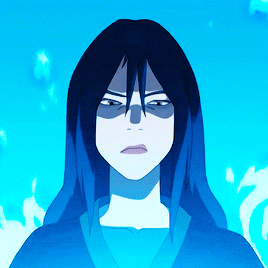
The poetic justice of Zhao drowned by the moon spirit’s other half, Ozai’s power stripped by a full-fledged Avatar... part of what makes Azula’s defeat so unique is her crumbling sense of self, an introspective enemy instead of an outside one. Katara, whose confidence and network of support are pointed out as the mirror image of what Azula could have had, finally gains the upper hand and pins her down.
From birth, the princess endures an environment that perfects and hones her nature to the shattering point. Plenty of signs point to her devolution: the betrayal of Mai and Ty Lee, getting sidelined by her own father at the literal crowning moment, and her irreversible childhood at the center of the snowball effect. But how ‘bout I do anyway, and tie in the mechanisms of the spirit world with Azula’s last moments? The connection is far from obvious, but well and present. The role of another world in weakening such an iron-fisted character visible in the first GIF itself.
I. “Taking you down is the Avatar’s destiny.”
The spirit world is one fundamental half of the Avatar. Its guidance and power are endowed to a messiah-like figure, who masters the four bending disciplines in order to restore and keep balance. It’s constantly reinforced that the Firelord is meant to be brought down by him, that a century of bloodshed is repaid when the warlord’s life is taken, and the end of his corrupt regime is the beginning of a fuller, more peaceful era.
“Aang, you must defeat the Firelord before the comet arrives.” (Roku)
“Your destiny! This is incredible. You will be involved in a great battle, an awesome conflict between the forces of good and evil.” (Aunt Wu)
“I should have seen this war coming and prevented it... But I believe you are destined to redeem me and save the world.” (Roku)
“Because I know my own destiny. Taking you down is the Avatar’s destiny.” (Zuko)
“Everyone, even my own past lives, are expecting me to end someone’s life.” (Aang)
A seemingly inconsequential detail is that the Firelord at the time of the final battle is not Ozai - it’s his daughter. By then, the title of Phoenix King is exchanged for her coronation. The nail on the head isn’t nitpicking terminology, but that Aang already suffered defeat at Azula’s hands. She herself plays a masterful and instrumental role in the war, literally her father’s will embodied. She’s there to hunt the Avatar, lead the massive drill against Ba Sing Se’s walls, orchestrate a coup, oversee the takeoff of the airship fleet, suggest the annihilation of Ba Sing Se in the first place. It’s a long time before we see Ozai at the warfront in the flesh, and even then, the damage dealt by Azula in Book Two and Book Three resonates. Keeping all this in mind, jump to Aang’s death.
“I went down! I didn’t just get hurt, did I? I was gone! But you brought me back.” (Aang, to Katara)
At the end of Book One, when a spirit is killed and revived, balance is reduced to moonless havoc, and all hell descends on the guilty party. The Avatar-slayer would be far from an exception to this counterbalance. So what we witness in “Into the Inferno” - Azula, gruesomely unmade - may just be the most brutal act of vengeance onscreen, and as a direct consequence of this:
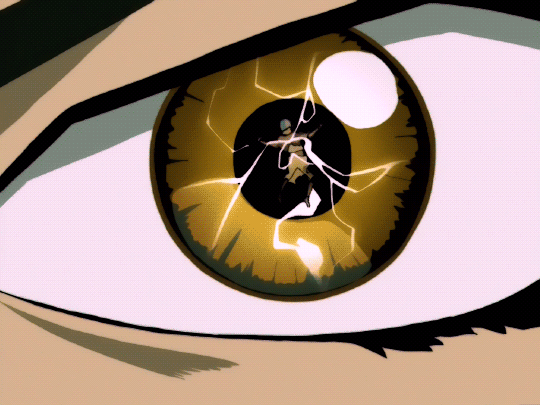
While Aang is not directly responsible, it’s safe to assume the spirit world often acts of its own volition. Notable spirits possess harsh views on modernization, and lash out at humanity for its flaws: Wan Shi Tong’s disappearance, the ocean spirit’s wrath, the aye-aye spirit in LoK antagonizing any human presence, the Mother of Faces admonishing vanity and disrespect.
In this vein, the Avatar spirit remains a powerful source of Aang’s strength, weaved into the very outcome of greater forces such as fate and salvation. In the crystal catacombs, Azula threw a wrench into a universal narrative - for an instant, the world really was lost.
And, truth is, we’ve already watched as an entity descended from the Avatar’s power - one who Azula identifies repeatedly as her lifelong plague - haunts her to the point of systemic delusion. Ursa herself, granddaughter of Roku.
II. “You’ve turned my own mind against me...”
Time to reconcile show canon with the comics!
There’s no one who ties more into the tragedy of Azula than her mother. Hello Future Me dredges “The Search” and “Smoke and Shadow” for panels where her condition is exacerbated by fear and animosity. She’s obsessed with the idea that Ursa was pitted against her from day one, and even claims her influence strangled the loyalties of her friends and forced Ozai to “break free of her control.” The possibility of the slightest truth to Azula’s more elaborate fears raises a host of alarming implications. Especially when acknowledging her character is as sharp as a tack - a dulled edge when madness factors in, to be sure, but not negligible.
Is it logical to develop the belief that Ursa was an agent of evil in the royal court? The death of Azulon and her subsequent disappearance... It wouldn’t take long for Azula - aware of Zuko’s fate at the time, and her mother’s resignation to prevent it - to connect the dots. Ursa’s blood relation to the same Avatar that rivaled Firelord Sozin is another thorn in the side of trust. Whether Azula was aware of it or not, the strife born in Zuko, the eternally entangled red and blue dragons, exist to her biology as well. This makes it difficult to ignore a spiritual side to her illness, which draws primarily from Ursa’s “ill” intent.
Azula is also seen embracing the idea that spirits risen solely to take revenge can derail lives, legitimacy, and loyalty. The comics give us a chance to absorb the hidden subtext at face value.
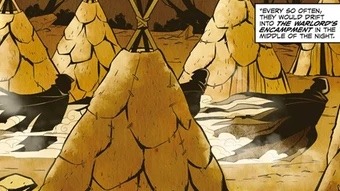
The Kemurikage were born when robbed mothers abducted the children of others as punishment. Fear of the spirits crumbled the warlord Toz’s support and ended his cause. The masquerading dissenters in “Smoke and Shadow” are able to undermine Firelord Zuko’s authority, create a divide between Mai’s family and her father, and sow widespread fear. Curfew, searches, and interrogations shape the beginnings of a “ruthless” rule, eerily evocative of Azula’s much more rapid descent...
So how do Azula’s visions of Ursa, conjured unconsciously or from a little something more, and her steep debt to the world and Avatar link together - forge the ideal weapon and circumstances for retribution?
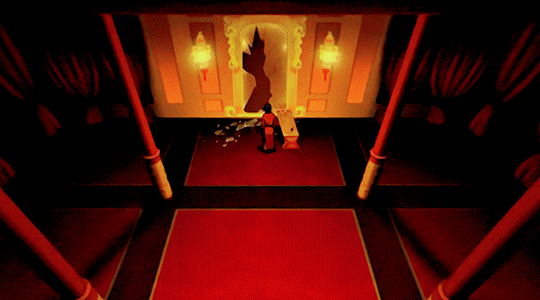
^ Just like that.
This only covers Ursa’s side of the family, the redoubling of spiritual balance after Aang’s fall like the snap of a rubber band. Azula’s complete undoing has to do with the lashing out of both families.
III. The blue dragon
Now, what was it about that first GIF?
Azula’s health begins to spiral right as she’s slated to become Firelord. Her identity is unraveled and called into question - Ursa made manifest slips through the chinks in her armor, prying at insecurities. Her inner turmoil admittedly makes her a poor candidate for ascension, and at the pinnacle of Fire Nation victory, - the crucial, final stages of the Hundred Year War - past rulers would look down on Ozai’s decision to usher her onto a seat of absolute power. Sozin’s Comet itself is an event that imbues firebenders with enhanced abilities, and it’s been theorized before that the “acting up” of royalty during the finale could be explained as such. The phenomenon may have also caused the reemergence of imperial spirits... and it isn’t too far of a fetch. More on that shortly.
It’s made clear that Azula’s destiny is far from holding royal court. The comics throw around that word, “destiny” a lot, but it’s a given signpost for any projected arc in the world of Avatar. And it ties in nicely with the will and workings of spirits.
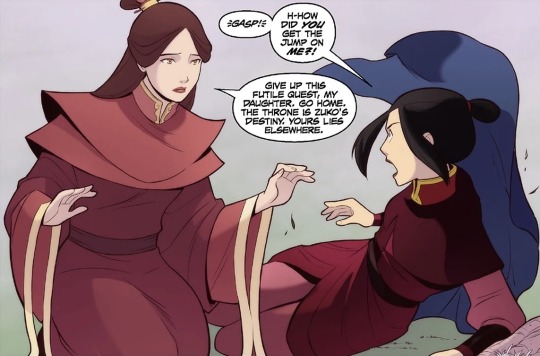
Roping predestination with the probable dissatisfaction of the lineage, we finally have a whole picture. The combined force of an upended natural order, demanding the Avatar-slayer’s penance, and a royal bloodline destabilizing her reign in its infancy... planting mistrust and paranoia, and causing rash decisions. From a cherry pit to five minutes’ tardiness, Azula’s clarity and self-assurance are hacked away.
This is inviting the subversion that it wasn’t all in her head. That the Azula who readily accepts the Phoenix King’s declaration is rattled and isolated at best, but far from the composure that took just one afternoon to shatter. Zhao and Ozai face justice at the hands of the spiritual. The third main villain of ATLA might not have escaped due consequence either.
Finally, this scene. Azula, ensconced in blue flames. Is there any suggestion of the presence of spirits?

Azula’s fire is blue for purposes of flaunting her skill and sheer drive for perfection. The hottest temperature is blue in color, exactly her achievement. The technique isn’t bothered with because it saps extra effort, and so Azula’s signature symbol of power is hers alone. Fitting. But the fact remains: after leaving her hands, the fire quickly cools to orange. See below:
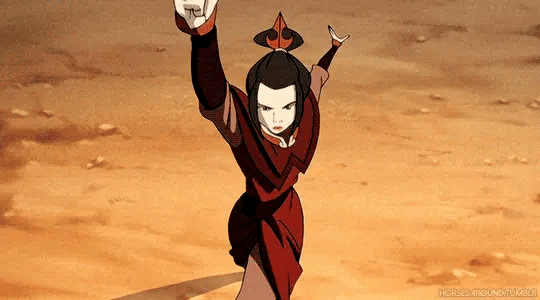
This color change isn’t seen in Azula’s throne room. The fire surrounding her is definitely detached from her body.
Now, it’s obvious why the animators didn’t suddenly decide to give the iconic blue a rest... but it’s incredibly intriguing from the imperial spirits angle. If Azula herself wasn’t keeping up the blue flame, then at the time of “Into the Inferno”, we’re staring into the faces of invisible devils on her shoulder, supplying the driving energy from the beyond. Onis whispering unseen evils down her ear that cause her, inevitably, to snap - the voices of Sozin and Azulon, a hundred sprawling generations. The cherry on the top is Ursa, descendant of the liaison between mortal and spirit that Azula personally killed, who torments her long after she’s relieved of the crown.
“Trust is for fools. Fear is the only reliable way.”
Hello Future Me describes Azula’s personality as a Machiavellian type, named after the guy who coined “It’s better to be feared than loved.” Watching her escalation unfold, it’s sad to wonder how someone as fearsome as her responds to being the recipient of that fear - when her own weapon turned on its hilt cuts too deep.
IV. End!

I think the scene above - the girl who opens with this directly after the demise of an admiral who engaged the incarnate of the tides (and swiftly lost), is a bit telling of her fate.
*To clarify, my framing of Ursa’s appearance as spookier than just a figment of Azula’s imagination - *cough* possibly the personified revenge of the Avatar spirit - is NOT meant to demonize Ursa herself! It just offers up an alternative explanation to what Azula hears and sees. Their bond is a poignant standalone, and I don’t mean to hate on the real Ursa/Noriko. Neither does any part of this discredit the impact of Azula’s childhood and history of neglect on her future.
That is all. Thank you for entertaining my theory!
28 notes
·
View notes
Note
Can you explain your thought process on your Greek myth edit? Particularly The last three? Thx! It looks great
Thank you very much :) OK, so I’ll go through each one to explain my reasoning:
Dany as Athena, goddess of wisdom, cleverness, law and justice, strategy, women’s arts, and nobler aspects of war: Dany primarily fits the justice, war, and strategy aspects of Athena. Her ASOS story is centered on her waging war in Slaver’s Bay. She sees the injustice that is happening there and puts her own plans aside to help the people there. Her victories are gained primarily through her strategic planning and she is able to minimize her own casualties. She also administers justice whether it’s against slavers or when making rulings during court.
Bran as Apollo, god of the sun, prophecy, youth, archery, healing, plague, and the arts: The physical embodiment of Bran’s soul is named Summer after the season where the season where the sun is the strongest. That’s also not so subtle foreshadowing that he’ll be the primary character to bring back the summer. Bran also has visions and can look into the past, with the possibility of seeing into the future.
Catelyn as Demeter, goddess of the harvest, agriculture, fertility, and the cycle of life and death: Catelyn comes from one of the most fertile regions in Westeros, which also happens to be the unofficial battleground of the kingdom where a great deal of death and destruction happens, particularly in the main series. During most of her time in Winterfell, she experienced a ten year summer, producing children. By the time autumn came she was parted from most of those children and lost her son. Now she’s one of the people bringing death and destruction during her afterlife as she continues to look for her daughter, Arya. Demeter’s most famous myth is the abduction of her daughter Persephone, which leads her to stop the growth of plants and sink the world into Winter.
Arya as Persephone, queen of the underworld, goddess of spring, flowers, rebirth, and vegetation: Arya is a little girl who loves the outdoors, particularly plant life. She likes flowers and tries to keep track of the different kinds. She also uses her knowledge of moss to tell direction. She was also born near the start of summer and knew only that season until she lost her family and began her first descent into an “underworld” in autumn. In ACOK, she goes further and further into the Riverlands which has become a region of death, fire, and decay. She even encounters two versions of Cerberus, the three-headed hound of Hades in the form of the Clegane brothers. Then she has to go to an even more overt underworld in the form of the House of Black and White where she has to join a death cult due to lack of legitimate options. According to GRRM, she’ll officially flower in winter.
Meera as Artemis, goddess of hunting, wild, nature, and chastity; protector of young girls: Like Artemis, Meera is non-gender conforming in her clothing and abilities. She’s a young maiden who is a hunter and she fishes. She’s also athletic and quick. She’s the food provider and physical protector of her group.
Sansa as Medusa: This sorting is influenced by the prophecy referring to “a maid at a feast with purple serpents in her hair, venom dripping from their fangs” and Sansa becoming Alayne Stone. Medusa was a beautiful young woman who was punished for being sexually assaulted by being turned into a gorgon, a woman with venomous snakes as her hair who can turn men to stone if they look in their eyes. The combination of those two details is likely meant as an allusion to Medusa.
Cersei as Aphrodite, goddess of beauty, sexual passion, pleasure, and procreation: This goddess is usually referred to as the goddess of love, but her power was less about love and companionship than sexual desire. Cersei is considered to be the most beautiful woman in Westeros. Even as she grows older, when she puts in the effort to do herself up, she is considered the next thing to a goddess. She also wields her sexuality and desirability as a weapon to gain things from men and control them. Aphrodite could also become jealous of human women were considered her equal or superior. For instance, when the human princess Psyche was considered more beautiful and gaining worship, Aphrodite sent her son Eros to deal with her only for Eros to fall in love with Psyche, resulting in a mother-in-law from hell situation (Cersei/Margaery/Tommen anyone?). Aphrodite also cheats on her husband repeatedly, most famously with Ares.
Jaime as Ares, god of war: In contrast to Athena, Ares was associated with the brutal, bloody, and savage aspects of war. Jaime is a man who enjoys combat and solves his problems with violence when he can. Just to compare, while Cersei saw the solution to Bran catching them in their affair to be soothing and manipulating the child, Jaime went straight for the kill. In his thoughts, he notes that he felt more comfortable with soldiers than at court. He also likens fighting to dancing. Combat is something he enjoys, glories in, and uses as a default to address issues when he can. Now that he has a disability, he’s thinking of ways around that.
44 notes
·
View notes
Text
Leave No One Behind: Meet the Characters

Leave No One Behind- An Ari Levinson fanfic by @what-is-your-plan-today and @icanfeelastormbrewing.
Character Profiles.
A/N- There isn’t much character development really over RSDR, and very little is known about our Characters’ back ground...so we have used a combination of fiction and facts either delivered by the film or what we have found via research on Mossad, the history of the Jewish people in the 40s through 80s and our imagination to bring this to you. It is, historically, as factually correct as we can make it, but if anything is wrong, we mean no offence. Take it as slight creative license...
"For wise guidance, you can wage your war."
All ages correct as of 1979
Name: Ari David Levinson
Alias: Guy Thomas.
Age 36-Born in 1943.
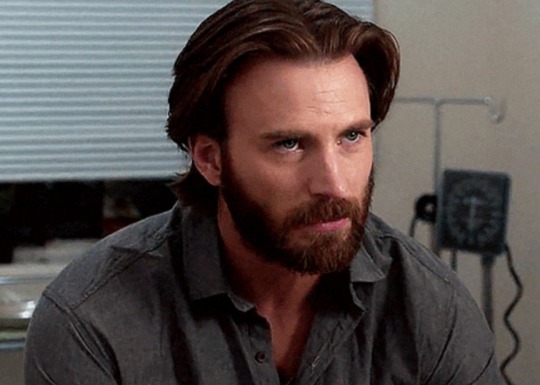
Background: Ari's mother, Amira Levinson was as Holocaust survivor, part of the 4,500 Jewish Immigrants who were carried from France to Palestine in 1947 on the SS Exodus, where they were refused entry. A British Soldier, Steven Thomas, took pity on Ari's mother and she surrendered her son to him for fear he would otherwise die. A year or so later, Steven Thomas met and fell in love with an American Woman, Edith Johnson and they married and moved to America. Ari returned to Israel age 18 to find his roots and embark on his University studies of Anthropology.
Ari has been a Mossad agent since he was 24. He joined in 1967 alongside best friend Sammy who he met aged 23 through Mutual Friends. Ari quickly became one of the most experienced Field Operatives around, specialising in extraction missions and intelligence gathering.
After a will they/won’t they/ they did fling of sorts with Hannah, which lasted 3 months or so, Ari met his wife Sarah in August 1971 and after a whirlwind relationship that left her pregnant, married in early 1972. Their daughter, Maya was born August that year.
Personality Traits: Ari is kind hearted with the desire to help people, but this drive and need to make a difference has made him selfish in some ways and neglectful of his family life, often putting his anthropology and vocation first. He is also stubborn and rarely known to back down when he feels he is right and is most certainly NOT a man with a plan, preferring to fly by the seat of his pants which at times means putting himself and his team in danger at times, although this is never done on purpose.
Simply put he doesn't know when to stop, but will genuinely move heaven and Earth to help anyone in need.
*****************
Name: Hannah Maria Horowitz (nee Navon Garcia) (OFC)
Alias: Rosa-Maria Gomez
Age 29-Born in 1950

Face Claim- Lyndsy Fonseca
Background: Hannah was born in Tel-Aviv to an American Jewish Father and a Spanish Catholic Mother, Hannah and Sammy's Mother fled the growing unrest in Spain to New York in 1935 aged 17. There she trained as a nurse and met their father. The two married in 1940 before Ethan was posted to Europe during the 2nd WW. After seeing first-hand the horror his people suffered in the Holocaust, upon his return Ethan became a Conscientious Objector and moved his wife and son to Tel Aviv in 1949, where he took up a post in the Israeli Government looking at how to help fellow persecuted Jews who were scattered across the globe. In 1949 he was one of the founding members of the Central Institute for Coordination which was a central body designed to coordinate and improve cooperation between the existing security services. This later became Mossad.
Following a short battle polio, Hannah’s father died when she was just 5 years old. Both her parents work and desire to help others inspired her to follow in her brother's footsteps and train as a Doctor. Hannah joined Mossad in 1973 aged 23 through as part of her Father’s Legacy and was one of the first Females ever to be deployed into the field. As a Field Doctor she was called to go wherever the need took her, and this includes running a number of operations as part of teams headed up by Ari. Through her links with Mossad she met Andy Horowitz, one of her brother and Ari's protégées and the two married in 1975. Andy was killed on a mission 8 months later in 1976. This spurred Hannah to leave Mossad behind and work at the Surgery her Mother set up in her Father's Memory.
Personality Traits: Hannah is a free spirit, very bohemian with an extremely fierce temper at times and a stubborn streak to rival Ari's. Being somewhat 7 years her brother's junior has led to her being mature beyond her years but also sometimes naive in the way she always tries to see the best in people, even if they possess few redeeming qualities. Hannah wears her heart on her sleeve, and does nothing by halves... including falling in love. The death of her husband left her reeling and for the first time ever questioning her life decisions.
*****************
Name: Samuel Ethan Navon Garcia (Sam or Sammy)
Alias: Liam Anderson
Age 36 Born in 1943
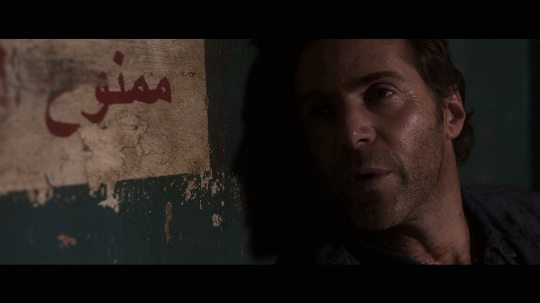
Background: Older brother to Hannah, 7 years her senior, Sammy was born in New York and moved to Tel-Aviv aged 6 following his father’s decision to join the Israeli Government. Following the death of his father when he was 12, seeing the care he was given inspired Sammy to become a Doctor and later a surgeon. He met Ari aged 23 in 1966 through mutual friends and the two bonded instantly over a shared desire, vision and passion to help fellow Jews who remained scattered across the globe and still suffering persecution.
Sammy joined Mossad 1967 as a Field Doctor, working alongside Ari on many an extraction mission whilst maintaining his regular role as a surgeon when not away active service. Sammy suffered a severe injury on one mission in 1973 after his right hand was damage by a knife in combat and this left him unable to perform surgery any longer.
Personality Traits: Sammy is extremely similar to his sister in a lot of ways, yet different in many too. Stubborn and opinionated, but more logical, able to let his brain rule his heart. This leads him to clash with Ari on many occasions over missions where he feels Ari is being reckless where he doesn’t need to be. Where Hannah is concerned, he is well aware she can fight her own battles, and for the most leaves well alone. However, when the chips are down the protective big brother rears his head and Hannah can find this overbearing at times, but frankly he doesn't care!
***************
Name: Maxwell James Rose (Max)
Alias: Irving Wilmington
Age 34 Born in 1946
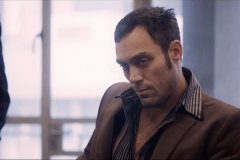
Background: Max was born to Jewish Immigrants in Queens, New York. Best friends with Andy Horowitz (Hannah's husband) since childhood, the 2 joined the army once old enough and were later head hunted for a number of one-off specialist missions by Ari after they came to his attention when the US army provided back up on a few of his operations. They joined Mossad full time in 1972 and were as inseparable then as they had been all their lives. When Andy died in 1976, Max continued to run a number of missions before leaving the service in 1978 and becoming a Mercenary, working for whichever intelligence agency wished to hire him. He considers Hannah one of his best friends, and she does him.
Personality Traits: Max is quite similar to Hannah in that they both live life to the full and take no prisoners. He is, however, a lot more placid but that means when he does lose it, it is done in spectacular fashion. His good humour and overall placid nature mean he is often able to diffuse many a situation and therefore is often the peace-keeper of the group, even if this role is unintentional. His one weakness, however, is food…and if you want him to do anything for you, he will in exchanged for a decent burger or sandwich.
**************
Name: Rachel Reiter
Alias: Angela Bluchel
Age 31 Born in 1948
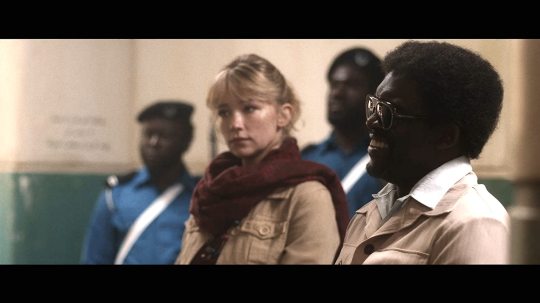
Background: Born in Munich, Germany, Rachel is the only child of 2 German Jews. After hearing her parents stories of the Holocaust, Rachel desired to also make a difference. As part of the recruitment drive in the early 70s, Rachel joined the Israeli Government and moved into Mossad in the same training intake as Hannah, the two of whom were the first ever women agents to be deployed. She married Brandon Cole, an American, in 1974 an had two children, divorcing in 1979. She remained part of Mossad, however opting to run low- key missions to minimise time away from her family.
Personality Traits: Rachel is your typical matriarch and being a mother has fallen into that natural role within the group. Old before her years she is logical, kind but also possesses a wickedly fast and logical brain. Alongside Max she often finds herself keeping the peace, specifically between Hannah, Ari and Sammy the three of whom seem to cause her a constant tension headache.
**************
Name: Jacob Thomas Wolf (Jake)
Alias: Luca Morano
Age 32 Born in 1947

Background: Jake is the only one of the group with no specialist Mossad Intelligence service training. Jake was born in Jerusalem to native parents and joined the Navy aged 20. A specialist Diver, he was hand-picked to run a few missions with Ari when required before leaving the Navy in 1976 to become a diving instructor in Central America.
Personality Traits: Jake embodies what everyone thinks of as they typical 60s spirit. He is laid back, willing to go with the flow, but possesses a very analytical eye which can enable him to see the bigger picture where often others can't. Often found topping up his tan in-between diving sessions, Jake has a dirty sense of humour, and absolutely no sense of when it is appropriate or not to use it.
*********
Name: Ethan Levin
Alias: N/A
Age 54 Born in 1925
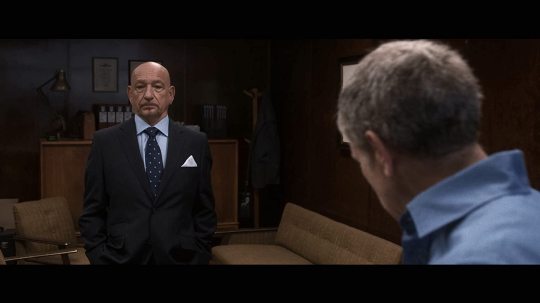
Background: Ethan joined Mossad aged 26 in 1951 after being spotted by Ethan Navon, who became his Personal and Professional Mentor until his death. Ethan fast rose through the ranks and is now the Head Intelligence Officer within Mossad, and the long suffering boss of Ari Levinson. Reporting directly into the Mossad Chief, Ethan is responsible for the coordination of the Key Undercover Operative Team, of which Ari is a member.
Personality Traits: Ethan is clever, logical and attempts to keep the rabble in check by obtaining a level of control of Ari, and commanding their respect. Having known Hannah and Sammy's dad, he is naturally a little protective over the two of them, well as much as he can be without showing direct favouritism. Despite his crisp exterior, Ethan cares and believes intently in the job his team are doing, and will back them as far as he is able. He sees Ari as a potential replacement to take his mantle when the time is right.
And there we have it!! Keep your eyes peeled for our first Chapter which is coming in the next few days!! As always, any asks/tag requests gratefully received...

#leave no one behind#ari levinson x ofc#ari levinson#red sea diving resort#red sea diving resort fan fic
66 notes
·
View notes
Text
Super Brothers (2/12)
Disclaimer: Superman and associated characters are the creative property of DC Comics.
Warnings: Child Abuse, Gender Dysphoria, PTSD and Anxiety, Character Death
Rating: T
Synopsis: Jon Kent knew he pretty much had the perfect family life, but something still felt wrong with himself. At the height of feeling like an alien in his own skin, however, his world got turned upside down when his parents took in a troubled child who embodied everything he felt he lacked. However, becoming a brother ended up being the smallest of the trials brought by adopting Christopher Kent. And being best friends with Damian Wayne has not exactly helped keep a neutral perspective on the matter.
A/N: This is almost late and I apologize. I have no excuses other than my brain is turning into as much mush as everyone else’s. But I really am enjoying where the future of this story is going and am really excited to get there. But, first, we have to reach some difficult places first.
Before we go further, I must say this: TRIGGER WARNING. There is overt child abuse and child harm in this chapter. It’s not super detailed and it gets cut off, but I do not want people to get upset from it without warning. So please take care of yourself first and foremost.
I’m blown away by the support this fic is getting so far and I appreciate you all so very much! Special thanks to the lovely comments and promotion from @secretlystephaniebrown, @spiralcass, @noartificialfruitjuice, @fred-astairs-dark-impulses, @karagordon, and elietrope on AO3 and tumblr!
Chapter Two: Pay in Full
Damian isn’t surprised when he is the lone attendant of breakfast the following morning. His wrists are still bruised up and a little painful from his restraints, but he ignores them under the cuffs of his school uniform and is the picture of polite society and manners. He eats confidently and alone.
It isn’t unusual, only disappointing.
Fortunately, Alfred is nothing if not an excellent reader of the atmosphere and does not force conversation or dullness on Damian that is unwarranted. He leaves the youngest Wayne to a peaceful meal.
The quiet makes it easier for Damian to overhear Alfred conversing just a step or so into the hall.
“Ah, Miss Cassandra, it is unusual to see you up and about at such an hour,” Alfred’s voice carries with a genuine mix of praise and surprise.
“Yeah, um,” Cass mutters, speech slurred with sleep, “can you, um, take me? Soon? He wanted to talk to me.”
“But of course. I can take you as I take Master Damian to the academy this morning.”
Starring toward the door, Damian lets his oatmeal slip off of his spoon and carelessly plop back into the bowl. He doesn’t even pay attention to the splashes of oats which end up on Alfred’s meticulously cared for table runner. He’ absorbed by the implications of the conversation happening in front of him.
After an encounter with Professor Pyg which ended as eventfully as his did, Damian anticipated some negative news getting to either his father or Grayson. And while Damian didn’t want for Dick to hear about Damian’s poor performances without him, there was at least some trust.
Grayson would be annoyingly supportive and want to use the entire event as some sort of learning experience.
Father is something else entirely.
After a few moments of subconsciously holding his breath, Damian glances down to his oatmeal and finds it suddenly subpar.
He pushes out from the table, chair legs protesting loudly, and tosses the handkerchief from his lap onto the table. Damian is on his feet and in the hall before Cassandra even has time to leave Alfred and redress herself for the day.
“Alfred, I do not need to attend the academy today,” he announces.
The butler tilts his head slightly and raises his eyebrows minutely. “I believe the education system would disagree with you entirely.”
“I have things to discuss with Father,” Damian elaborates stiffly. “Important information that outweighs any supposed social-developments I am pretending to make.”
Cassandra scratches at her jawline and frowns at Damian. She’s assessing him, her dark eyes boring into Damian’s soul and evaluating every tremor of his muscle.
Which makes it even more annoying that her choice of commentary is to say, “Bad at it. Pretending,” she jokes.
“Silence, you,” Damian hisses ferally. “The entire first year I lived here, I had to listen to everyone talk about you and never once did they mention your sass.”
She offers a half-shrug. “Forgot the best part.”
“Tt, more like the worst,” Damian teeters, hands on his hips.
For a moment, Cassandra seems to be ignoring him as she looks over Damian’s head at Alfred and rotates her shoulders. “Maybe shouldn’t go to school,” she offers, surprising Damian entirely.
Alfred seems just as taken by the suggestion and looks at her suspiciously. “Why so, Miss Cassandra?”
“Had a bad night,” she explains. “Probably does have important stuff to say.”
Heat flushes into Damian’s face. His eyes glaze into a distinct red hue and his shoulders tremble as he clutches his hands into fists by his side. There is almost certainly steam coming off of him as anger overtakes him in a way that it hasn’t for ages now.
“How dare you!” he roars.
All too casually, Cassandra glances down to Damian and raises an eyebrow at him. She doesn’t say anything with words.
“How dare you assume so much about me! You don’t even know me!” Damian continues, bringing his fists up as if ready to brawl. “Perhaps what I’m going to do is while you wish to tattle to Father, I’ll tell him the truth about how you are nothing but an interference here in Gotham! That you do not deserve to trespass on my affairs! And that absolutely everyone wishes you would bugger off again so that everyone can go back to the way things were!”
“Master Damian, that is enough!” Alfred says coolly. He never raises his voice, but he never needs to.
Despite himself, Damian snaps his jaw closed. But he doesn’t stop glaring into Cassandra’s face, her eyes. His anger is still boiling over, no matter how much he’s contained it.
Cassandra looks back at him, her face drawn and unreadable.
It makes Damian even more upset.
“That is no way to speak to anyone, certainly not family,” Alfred reminds Damian. “Considering your injuries—“
“I am not injured that gravely, Pennyworth!” Damian sputters again.
“—I can see the benefit to a day of recuperation from school, so long as we do not continue this theme habitually,” Alfred persists. “We will leave for your father’s office as soon as Miss Cassandra is ready to leave. And we will not leave a moment sooner than that.” He looks to Cassandra and pats her shoulder. It’s the only thing that gets her to pull her gaze away from Damian. “I encourage you to get ready for the day at your leisure, my dear.”
After that, the conversation is over, and Damian ends up sitting in the foyer waiting for the better part of an hour as Cass does just as Alfred insisted.
***
“There he is!”
Jon is still wiping at his eyes as he stumbles through the apartment. It’s difficult, in these early mornings, for him to focus on appropriate amounts of strength, so he shoulders into furniture a touch too hard or bangs into the doorframe with enough force to send pictures lined down the walls tumbling down.
Some things that are less natural to him since his coming into power, like flight or his special types of vision, take more effort and alertness. Not his super strength, however fortunately or unfortunately.
He stumbles his way into the kitchen, his feet padding over the shift from hardwood to tile. He can smell the scrambled eggs before his dad even set them on Jon’s prepared plate.
At the table across from Jon is his mom, already in a beautiful silk top with a gold necklace of large geometric squares. Her chin-length hair is curlier than usual which means she hasn’t straightened it. Her lashes are long, nearly swooping down to her cheeks as she looks down to her iPad as she reads. When she takes her cup away from her lips, a dark purple lip stain is left behind on it.
Jon admires her for a moment, scooting into his seat but not pulling up to the table.
“Good morning, honey,” his mom says full of affection. Her violet eyes glance up to his face.
“Good morning,” Jon says back, smiling brightly.
“Leave walking room, champ,” his dad says from behind. Before Jon can even think, two massive hands close in around the edges of Jon’s backrest, then his whole chair is lifted and scooted up until Jon’s chest nearly bumps the table.
“Sorry, Pa,” Jon says automatically, sparing a glance as his father moves over and plants himself in one of the two chairs between Jon and his mom.
Even in a collared shirt and sweater vest, Jon can see what a massive shadow his father leaves for him. He is broad-shouldered and firm, even with his softness. He has a body that exudes power and strength. It’s only with folded in shoulders and deflated presentation that Clark Kent can convince the world there is a difference between himself and Superman.
At home, among family, as Pa, Jon knows his dad is unmistakably Superman.
When Pa’s large hands reach for his cup of orange juice or poke at scrambled eggs with a fork, it makes Jon look at his own hands.
They’re thin, nimble hands. Soft.
Mom has said on more than one occasion that with fingers as long as his, Jon needs to either learn piano or practice keyboard typing. And Jon is certain he has no ear for tunes.
“I almost came to get you a second time, young man,” Pa says between bites of eggs. “I warned you before about staying up late. I know there are plenty of things an eleven-year-old boy thinks are cooler than sleep.”
Curling his nose, Jon shifts uncomfortably. “I’m almost twelve now,” he reminds them. “You said I could push curfew when I turned twelve.”
“And you’re still not twelve,” Mom says, closing out the tabs on her iPad. She looks very seriously at Jon. “And it doesn’t matter what age you are, my mother’s intuition tells me you’re watching scary movies with the Wayne kid again.”
“No, I wasn’t!” Jon squeaks. “I promise I wasn’t!”
“You had nightmares last night, Jon. We share a wall with your room,” Pa says, face the picture of sympathetic. “And it’s okay to have nightmares sometimes, but you’ve been having them a lot lately. Something like that would usually require something scaring you.”
“Like movies,” Mom adds, still eyeing Jon suspiciously. “Is it Gotham? Maybe we shouldn’t let you go to Gotham so much. Especially this time of year. I hate that stuck-up little island, Clark. No wonder he’s scared.”
“Wait, no, it’s not anything to do with Gotham or movies or Damian,” Jon argues emphatically.
Both of Jon’s parents stop and do the thing Jon has come to hate most during their meals. They look up, toward one another, and seemingly carry out an entire conversation with each other through micro expression alone. It would be adorable if they weren’t his parents.
Jon decides to take the time to begin shoveling in his eggs. His dad’s cooking may be simple but it’s always filling.
“Do you want to talk about these nightmares you’re having, Jon?” Pa asks gently. “You and your body have been put through a lot of changes very quickly over the past year or so. You’ve gotten your own powers, you’ve moved schools twice, your mother and I both are back at full time. That’s a lot.”
He chews over his father’s words for a long moment and considers them.
For most of his young life, Jon Kent has been able to tell his parents positively everything on his mind. They are loving, supportive good people. The best people. Whether they’re superheroes or super reporters, they make Jon proud with almost every second of every day.
But his nightmares make his throat fill closed and tight in ways that are impossible to express. He likes to think they could know, but it feels like they couldn’t.
They couldn’t know how certain words or certain looks or certain things make him feel like he’s crawled into someone else’s skin. Like he’s been lying to everyone on accident this whole time. That what people see him as is undeserved.
What could he ever say to explain that?
Not to mention, explaining that he was patrolling in Gotham and got captured by some madman like Professor Pyg is probably worth far more trouble than simply admitting to scary movies with Damian.
“I don’t remember them,” Jon lies through his teeth.
“That can happen,” Pa says warmly.
When Jon looks up, it’s unsurprising to see that his mother’s face is fairly neutral. She looks at him worriedly and unconvinced.
If she plans on saying anything, however, the moment eludes her. Her iPad lights up simultaneously with the default ding of her phone. She glances at them both before getting to her feet. She’s a full inch taller in her heels and wearing Jon’s favorite skirt of hers.
“Clark, are you going to take Jon this morning?” she asks. “I can use it to excuse you from any early bellows from Perry.”
“Of course,” Pa says, leaning back and tilting his head for the optimal kissing angle.
Mom comes around the table and ducks down, holding back her hair delicately as she kisses Jon’s forehead. “Have a good day, hun, I love you.”
“Bye, Mom, you look beautiful,” Jon informs her as she leaves.
He watches her go and takes a breath. His gaze is only broken when his dad holds his glasses out in front of his vision.
“Don’t forget these,” Pa reminds him.
“Oh, thanks,” Jon mutters, taking the thick frames. His motion is stopped, though, as his father doesn’t let go. He glances back up to Pa and raises a brow.
“Jon, do you know how polygraphs work?” Pa asks, still not letting go of the glasses.
“Um, not really,” Jon admits.
“They measure your heartbeat, because if someone’s not a good liar then they will increase their heart rate, and the machine records it,” Pa explains as he finally lets go of Jon’s glasses.
Despite himself, Jon’s heart picks up its pace. He glances down to his lap. “Do you always listen to my heartbeat?”
“Since before you were born,” Pa says softly, running his broad hand over Jon’s hair. His thumb strums the locks affectionately. “And you thought I was the easy parent, huh?”
“I just don’t want to talk about my nightmares yet,” Jon explains worriedly.
“That’s okay,” Pa assures him, letting go of Jon’s hair. “But I’d appreciate you not lying to me or your mother.”
Jon frowns. “I won’t, Pa, I promise. Sorry I did.” He glances toward his mother’s seat and notices her coffee mug sitting where she left it. Her purple lipstick is still staining the side. “Do you listen to mom’s heartbeat?”
“Practically since the day I met her,” Pa laughs, picking up both of their finished plates. “I always listen out for the hearts of the people I love. It’s,” he pauses in thought before continuing his walk to the sink, “it’s comforting to know everyone’s safe.”
Humming some, Jon puts his chin on the kitchen table and focuses. His mom should be in the elevator on her way down. If he uses his x-ray vision he could even watch her. But instead, he listens. It’s hard to focus on the beat alone, to isolate it. It could give him a headache until he’s better at it. But Jon can do it.
It’s one of many things he can do, he can be because of his father — a polygraph.
But as he listens for his mother’s heart, Jon wonders if there are more things he can do and be because of his mother.
“Pa, it’s a good thing to want to be more like mom, right?” Jon asks before he can stop himself.
His pa lets out a deep laugh over the running water in the sink. “Jon, everyone wants to be more like your mother. It’s the most natural thing in the world.”
And that, Jon decides, is comforting.
***
Lor-Zod learns through the sunstones in silence. His eyes are transfixed on their histories and piloting and mathematics, but his mind is distantly occupied.
His mother has stood vigilant at the door, unmoving, the entire morning. She has not greeted him yet, has not introduced herself to him. Standing, quietly, scathingly.
The moment Lor finishes his aeronautics lesson, he feels his mother’s hand close around his wrist. He is reaching for the next lesson, but she is suddenly upon him, stopping him. Her face is mere centimeters from his own. Her nose snarls.
“You are summoned, Lor,” she tells him, as though he should already know.
“Where, mother?” he barely has air in his lungs to ask before he is jerked into the air and guided through the halls of their palace.
As they travel swiftly through their palace, Lor notices for the first time that he has not seen servants or even heard servants all morning. That is beyond unusual, and it makes their giant crystalline halls even more empty than normal.
Something sits unsettled and worrisome in Lor’s chest. He can hear his own heartbeat in his ears.
“What are we doing, mother?” Lor attempts again, voice tight with fear.
“Is a child to speak out of turn?” she asks angrily, her brown hair whipping across her face as she looks over her shoulder.
Lor obediently shakes his head. “No,” he answers.
“Then you have no turn,” she informs him. When she looks ahead once more, her fingers tighten around his wrist. “There is a lesson to be learned today.”
Silence overtakes Lor as they reach the grand hall and entrance of their palace. There still are no servants to be seen, and there is also no sign of the general. Every hair on Lor’s body stands on end as he realizes just how wrong everything is set up to be.
But he cannot even force himself to speak. He knows better. His body knows better.
As they bound out of the giant doors to their palace, Lor realizes that they are opening up to an enormous gathering. There are purple-skinned Jekuul natives for as far as Lor’s unaided vision can see. They all face forward, toward the intimidating staircase to the palace’s entrance. And to the general.
General Zod does not even turn his shoulders toward Lor and his mother as they come to his side. He is facing forward, over the crowd.
Lor is positioned harshly, stood in front of his mother. She swiftly shifts her hand from his wrist to his shoulder, her other hand matching it. They grip him fiercely, nails clicking against the Kryptonian armor beneath.
When Lor looks up to his mother’s face, he can only see her chin as it faces the general obediently.
Then, when Lor follows her gaze, he lets out a soft gasp.
They are not the only ones standing on the stairs. There is also a familiar, tiny purple girl in his father’s grips.
“Ti’ahl? What’s she doing here?” Lor asks before his mother’s grip becomes even more constricting. He feels his chest freeze up, his heart pounding again.
“You are out of turn, child,” she hisses down at him. “Watch.”
Swallowing, Lor looks back to the General.
The General seems satisfied after Lor falls silent, and he begins speaking out in a tongue so strange but familiar. His voice booms and echoes over the silent crowds below. He’s speaking in Jakuul, Lor knows that much, but still not what his father is saying.
For a moment, Lor tries. He tries desperately to understand what is being said, but none of it makes sense. There aren’t even the familiar possibilities of understanding like he had with Ti’ahl just the day before.
Thinking of Ti’ahl, Lor glances down from his father’s face to where Ti’ahl stands trembling in the General’s grip.
She looks paler than yesterday, her purple skin lighter in the face and almost blue in her cheeks. Her big, dark eyes are tear-filled and sunken, her hair messy. It occurs to Lor that she is wearing the exact same clothes that he last saw her in.
Only at that moment does Lor realize she never made it home last night. But he can’t imagine why.
Deep down, Lor wishes to speak to her, to comfort her, to offer his cape once more, but she doesn’t even have it now. Lor wonders, idly, where it might be.
The General’s voice picks up in fervor, growing in a tempo as the crowds below become unsettled.
Lor doesn’t know what to think, what’s going on when he sees his father wrench Ti’ahl’s arm back and up into the air at a frightening angle. It makes the little girl scream in shock and begins crying, tugging.
Not sure what is going on, Lor opens his mouth but nothing comes out.
With a flick of his wrist, the General turns Ti’ahl’s arm completely upside down and a hideous snap echoes through the hot Jekuul air.
Stunned, Lor stares at his father and at the little girl he played with yesterday. The air erupts with high pitched squeals and sobs from the crowds below. Ti’ahl herself hangs limply unconscious, only held up by the General’s tremendous grip on her arm.
His mother holds him down with so much force, Lor feels as though he will sink through the stairs. He can’t look at her, can’t hear her past the thundering pulse in his own ears. He stares only at his father who is happily soaking in the shock and awe of the crowds.
Then, Lor snaps.
All he can see is red and then his father’s shoulder is smoking, singed.
And, for the first time since the night before, General Zod looks at Lor.
“I am disappointed, Faora,” the General says angrily. “You assured me that our child was being raised in the traditions of Krypton. Are those traditions not that punishments are handled by the mother?”
“They are,” Lor’s mother says, aghast, before yanking Lor into the palace doors.
Lor hits the floor before he even sees the smack coming. And it is only the first.
He hardly feels any of it, numb to everything with the sound of that crack echoing throughout his whole body.
#Damian Wayne#Chris Kent#Jon Kent#Cassandra Cain#Alfred Pennyworth#Lois Lane#Clark Kent#General Zod#Ursa#writing#super fic#Super: Super Brothers
33 notes
·
View notes
Text
Choosing a New Name for a Truer Body: Introducing Persephone
After coming out as a Transgender Woman a few days ago, nothing has really felt the same. Or, in more positive terms, everything is feeling more real. I’m openly talking about being and feeling like a woman. How my gender dysphoria has confused and harmed me for the past twenty one years and all the many transitions (Socially, culturally, physically) that will and are currently happening to me.
Upon this, just yesterday, me and one my best friends, Emma, were swimming at a nearby lake here at Eastern Washington University. We had been playing around with names. For a moment I was dead set on the name Camilla. It had a C in it, like my boy name so it felt familiar. It allowed me to feel comfortable, passable, and like a cis-woman. A simple name that no one would question, look at, or invalidate. In a way, the name Camilla itself made me feel like it would protect me from the cis, straight world but as all trans women come to know, I would never be accepted there. A fate Persephone came to understand too.
I expressed this to Emma on the trip. How I wanted to find a name. A name that really encompassed my story, my truth, and my unwavering love and comfortability in womanhood.
Emma is an art history major and is just an overall intelligent girl. I asked her about names that would fit me in her realm of knowledge. Maybe some from the greek classics and/or greek myths.
This is when she told me the story of Persephone, the greek goddess of spring and the underworld. I was in complete euphoria hearing the story and swaying on the surface of the buoyant, dirty water. I felt like a true women just then as Jalaja Bonheim’s writes on her website,
“When women get together, they tell stories. This is how it has always been. Telling stories is our way of saying who we are, where we have come from and what we know. Women have always found sacredness in the midst of the ordinary, harvesting spiritual wisdom from the fields and forests of their everyday embodied experience.”
Emma went on to tell me the story and the raping of beautiful Persephone. I felt myself slowly being connected to this woman. To her entire experience. I felt myself slowly unpacking, relating, and bonding to this mythical figure.
Persephone is seen as a more vulnerable goddess. Where relationships are essential to her life, as they are to my own. Her whole life, a relationship has taken the lead. Most times over what she really wants and desires. She is known for putting the needs of others over her own, something I have struggled with my whole life.
Her mother, the powerful goddess Demeter, is controlling and desperately wishes to be with her daughter at all times. Her rapist and husband Hades forces her for a third of the year to be imprisoned with him. She is even the goddess that welcomes the living and shows them the underworld and teaches them about life and death. Plus her constant affairs and dramas with the other gods all goes to prove that this woman takes the people and relationships in her life very seriously.
This isn't to be confused with weakness, confusion, or stupidity as so many people try to say she is. She loves and she loves hard. She knows both love and loss profoundly. She knows the horror of powerful men deciding and controlling her every move. She knows what it means to transcend through death (her being brought to the underworld with hades) and to be born again as a more powerful, authentic, and understanding woman (when she becomes free again with her mother, picking flowers). She knows sisterhood, struggle, and lust. To me, Persephone is the definition of my womanhood. She embodies a lot of what womanhood looks like for myself and my life.
The article “Greek Goddesses and the Wisdom of 7 Feminine Archetypes” by Ibtisaam writes about this group of vulnerable goddesses, saying
��Vulnerable Goddesses (Hera, Demeter and Persephone)... Correspond to traditional roles of wife, mother, and daughter. They are the relationship-oriented goddess archetypes, whose identities and well-being depend on having a significant relationship. They express women’s needs for affiliation and bonding… each of them also evolved, and can provide women with an insight into the nature and pattern of their own reactions to loss, and the potential for growth through suffering.”
Focusing more about Peresphone the author writes
“Persephone contains within her the dual archetype of the maiden (a young goddess, innocent and associated with fertility) and the Queen of the Underworld (“who reigns over the dead souls, guides the living who visit the underworld, and claims for herself what she wants”). To be the maiden has less to do with age than it does to do with “being the eternal girl who doesn’t commit herself to anything or anyone, because making a definite choice eliminates other possibilities”. While this allows for great adaptability, in order to truly grow, the Persephone woman must learn to make commitments and to live up to them. Failing this, she will forever be a victim of the will and power of others, becoming a long-sufferer or martyr. However, her descent into the underworld shows the possibility of pain forcing growth. As the Queen, Persephone symbolizes receptivity, intuition and empathy to the suffering of others. Thus, Persephone’s gifts include the cultivation of imagination and inspiration.”
As Emma contuined on with the stories I noticed many men started to take the form of Hades in my vision. My dad, my step-dad, my first love, my brother, and the male world at large. Hades had come to symbolize body dysmorphia and the privileged male world.
Here is Persephone, me. A girl picking flowers, enjoying and comforted by her mother, resting in her beauty and strength. Thinking of nights with her sisters, of lust and love. A girl that wanted to see things, know things, teach things. A girl that wanted the comfortable, dramatic, and loving life as a wife and sister. Just a woman, end of sentence.
Then a man comes. He corrupts, harms, and oppresses her. Steals her away from her mother and her sisters (stealing her away from her womanhood) and into a world of oppression, abuse, neglect, and pain. A world that some could see, as I do, as a males world. A world that I nor Persephone have been allowed to survive in. Hades kid-napes her, rapes her, holds her prisoner, and slowly tries to make her become what so many women fear to become: a shell of her former, womanly self.
I felt a massive connection here, I knew what it was like to be taken from the world of women (as I was younger) and into the world of men (when I was older) and feeling completely disgusted, unnerved, and wrong about it.
But, Persephone is not weak. She’s smart. She was able to become free. Hades had fallen in love with her womanhood the moment he saw it and she knew that this was his biggest flaw. She had something that she could use. She decided to be his wife because even though he symbolized and represented the worst of manhood, she knew there would be freedom in having access to both worlds. In having relationships in both worlds. She does this even when others don't understand it. Even when people try to rob her of her femininity, she powers on as the undercover ruler of both worlds.
I relate to this as a woman who consistently feels divided between these two spheres.
My world of womanhood where I am truly myself, beautiful, and authentic. With other women who protect and respect and care for me. Who love me. Where I can flip my hair, cry, drink wine, and talk about struggle. And the other world, the underworld, where I am surviving, working, and grinding to change and mold into a body and life that is not mine.
Persephone knows pain, hurt, loss, and grief. Her mission is to help every passenger, in both worlds, better understand themselves and the complexities of living life. This has always been my mission as well and hurt as been the greatest teacher to both of us.
Persephone symbolizes everything I have felt myself to be as a woman. Loving, forgiving, powerful. A woman who gets what she wants even when everyone thinks they have her in the bag. She knows growth and transformation. She is a woman that I have always felt myself to be.
So now, with the thanks of Emma and research, I am changing my first name to be Persephone. A name that my younger self would've cherished. A deserving name for a deserving woman.
7 notes
·
View notes
Text
part three: fatherhood and faith in August Rush
/ part one // part two /
A day before the concert at which both Lyla and Evan are due to perform, Arthur sees August’s name on a poster, and Wizard turns up at Juilliard. He rails at the Juilliard professors for daring to think they had anything to teach Evan, for believing that they could give music to him when music is “out there”. Evan says he doesn’t want to go, he likes it here, the professor says Wizard doesn’t have any right, but Wizard says, “I have every right, I’m his father.” And when Evan stands frozen, wishing to contradict this, Wizard whispers to him, “I know your real name, Evan…Evan.” Evan doesn’t want to lose this new family – but he doesn’t want to be sent back to the group home, where there is no music at all. He tells his professor, “He taught me everything I know,” and he lets Wizard lead him away.
The next day finds him playing in the park again, while Wizard argues on a nearby payphone, trying to eke out as much money as he can from whoever’s on the other line in exchange for August’s performing. Arthur reassures Evan; Wizard isn’t that bad, he’s just been in a mood, and Evan’s the only one who could make him feel better. Arthur couldn’t get Wizard’s favor, so he did the next best thing and won himself second-place by leading him to the chosen one. Evan knows better to be satisfied by Wizard’s favor, now, and he plays morosely, putting all his frustration into the music.
Louis walks up and puts a handful of change into Evan’s guitar case. He asks about Evan’s guitar, and Evan looks nervously over at Wizard, but Louis reassures him, “Don’t worry, I’m a musician, too.” He hands Evan his own guitar, and Evan passes him the one he got from Wizard; they sit together on the grass and experiment. They improvise a duet, Louis in a typical combination of strumming and fingerpicking, Evan in his signature style of hitting the strings. It’s both like and unlike Louis’s unwitting duets with Lyla, like, because the two different styles weave in and out of each other, allowing both to shine, and unlike because they’re both guitarists, both improvising. It’s fellowship and mentorship embodied in the music, rather than complementarity and romance. Evan comes back to life; he smiles again.
Louis asks him how long he’s been playing; “Six months,” Evan says, matter-of-fact. “Six months??” Louis repeats, “How’d you learn to play like that in six months?” “Juilliard.” “Juilliard,” Louis says, no doubt thinking about his lost love who graduated from there herself. “I have my own concert tonight,” Evan says. “Reckon I should believe you?” Louis asks, teasing. “Yeah,” Evan says, simply, but then adds, “but I can’t go.” “Why’s that?” Louis asks. Evan says, “It’s kind of a long story.” He’s closing himself off again, hiding. Louis says, “Well, if I went to Juilliard and I had a concert tonight, I wouldn’t miss it for the world.” “Yeah,” agrees Evan wistfully, “but what if something bad would happen if you did it?” Louis smiles, and tells him with the certain authority of experience, “You never quit on your music, no matter what happens. Because anytime something bad happens to you, it’s the one place you can escape to and just – let it go. I learned that the hard way.” You can’t escape the perturbations of love by giving up love; you can only find peace by turning from failed love to true love, from fallen human love to divine love. “Anyway, look at me,” Louis says gently, “nothing bad’s gonna happen. You gotta have a little faith.” Evan stares back at him thoughtfully, and then plays two notes in answer. Louis laughs – he understands. “I’m Louis”, he says. “Ev – August. August Rush,” Evan says, remembering only halfway through to use his new name. Louis makes him feel safe; being found and known for who he is by this man is not something he naturally fears – he has to remember to hide. Wizard yells for August; Louis admits he has to get going. “Bye,” Evan says. “Yeah…” Louis says, looking at him with his head cocked, wondering and worrying and caring. He reaches out and tousles Evan’s hair, which Evan allows placidly.
Louis didn’t recognize Evan on sight, like Lyla did – granted, he didn’t know Evan existed, but there is a sense in which he is inherently more “distant” from Evan than Lyla is. He didn’t carry him for nine months, and so his “recognition” of him is different. Evan is an individual to him, in some ways an equal; they speak the same language; Louis gives him advice like he’s a peer, teaches him from his own experience, leading by example. But he is not distant from Evan in the way that Wizard is; he cares about Evan for his own sake, he’s not trying to manipulate him or string him along emotionally. The distance is for the sake of allowing Evan to flourish as himself. This is fatherhood. Before Louis even knows he is a father, let alone Evan’s father, he gives Evan the first true image of fatherhood he’s had.
Furthermore, Louis’s last word to Evan, “nothing bad’s gonna happen, you gotta have a little faith” is the antithesis to Wizard’s system of pessimism, fear, and self-protection. It seems like naivety; Louis doesn’t know what Evan’s situation is, and what if something bad does happen? Bad things happen to people all the time. But here’s the kicker: good things happen too. And faith is believing that, ultimately, good has more weight – even when you can’t see it, even when the bad is right in front of you weighing you down. There’s a great quote from Ratzinger in Introduction to Christianity:
[The word “credo] signifies the deliberate view that what cannot be seen, what can in no wise move into the field of vision, is not unreal; that, on the contrary, what cannot be seen in fact represents true reality, the element that supports and makes possible all the rest of reality….Man’s natural inclination draws him to the visible, to what he can take in his hand and hold as his own….He must turn around to recognize how blind he is if he trusts only what he sees with his eyes. Without this change of direction, without this resistance to the natural inclination, there can be no belief. Indeed belief is the conversion in which man discovers that he is following an illusion if he devotes himself only to the tangible…and because our inclination does not cease to point us in another direction, it remains a turn that is new every day; only in a lifelong conversion can we become aware of what it means to say “I believe”.
I think a part of what it means to turn from the tangible to the spiritual is to turn from despair because it feels like all we see is suffering, to faith and hope because the divine plan is real though unseen. To say, despite the lack of empirical evidence, that if you choose love no matter what, nothing really bad’s gonna happen, nothing so bad that it will make the choice a mistake. Louis gives Evan an example of faith, and he gives him encouragement and kindness, with no ulterior motive. Because of this encounter, Evan is given the strength to choose faith himself.
When Wizard is counting their earnings in a subway station at the close of the day, Evan tells him he’s leaving, and he’s not coming back this time. Wizard scoffs. Why would Evan leave? To find his parents? “I bet they don’t come, because they can’t hear you,” he says cruelly. Evan stands poised, ready to run, but caught in Wizard’s lies and the fear that comes from them. And then Arthur hits Wizard, hard, with the guitar that used to be his – he’s giving up his own hope that Wizard will be his father in order to set Evan free. And Evan runs, but even when he’s gotten away from Wizard, the man’s words weigh him down. He’s underground and he can’t get to the surface.
This is when a faint music starts to echo through the vents above him. Lyla and Louis are both playing, just as at the start of the film, each of their pieces weaving in and out of the other. Lyla is pouring everything into her playing, her love for her son and her pain at missing him and her wish to be reunited with him. And Louis, who doesn’t know that he has a son, is singing to Lyla. But unlike in “This Time”, where he returns to their moment over and over, wishing every time that it’ll be the last and he won’t have to go back again, he’s reflecting on what brought Lyla to him in the first place. Instead of focusing on the loss, he remembers the hope: “you wanna reach out, you wanna give in, your head’s wrapped around what’s around the next bend…something inside you is crying and driving you on”. He comes to the conclusion that though their love was imperfect, there was something truly good in it, and he doesn’t regret that goodness, he wouldn’t take it back: “‘cause if you hadn’t found me, I would have found you.” In freely affirming the love he had for Lyla, he also affirms the fruit that was borne of it; in affirming the goodness of an imperfect love, he affirms the goodness of Evan’s very existence. He opens his heart and sings to Lyla, he doesn’t regret being found by her, and he would go out of himself to find her if he had to do it all again, and Evan’s deepest wish is fulfilled: he is found. His mother’s love for him, and his father’s affirmation of his existence find him in the music, and they draw him out of the dark.
Wizard is left alone, underground. He pulls out his harmonica, and plays a melody, letting it rise into the vents, hoping that Evan will hear it. It is the melody that Louis and Lyla heard the night they fell in love – Wizard played a role in the intertwining of all of their stories, and he played a role in Evan finding his way back to his family. In the mercy of God, great things were done through this broken man. But no one hears him, now; his role is complete. Everyone else has learned to play a new song, and he’s trapped in the past by his refusal to hope for something greater.
At last, Evan takes the stage in the park to conduct the rhapsody he composed, the piece he wanted to play to as many people as possible so that maybe his parents would hear. It’s the response to all the music he has heard in the world around him, in the fields and in the city and in the church, unified into a whole; he takes what sounds like chaos to the untrained ear and turns it into beauty, so that we, too, can hear it. Lyla, who is walking across the grass in her white dress, pauses, listening, and then turns around and strides back towards the stage. Louis hears the music in his cab with his band, but it’s not until he sees the poster, recognizes August’s name, and then sees Lyla’s name below it that he moves. He jumps from the cab and runs through the streets toward the concert, Lyla’s “marriage” totally forgotten. Lyla is looking for Evan; Louis is looking for her.
Evan is facing the orchestra, Lyla can only see him from the back, but she’s mesmerized by the music. Louis catches sight of her across the crowd. She walks forward as if drawn by an unseen force; he weaves through the crowd parallel to her. She steps out in front of the people, stares up, her entire person attuned to the music, and she knows. This is her son, who has been in her heart for so long. She’s found him. Louis steps up beside her silently and takes her hand; she looks up at him, and there’s no surprise. Of course he is here; of course he was drawn, just as she was. Everything is falling into place; they are, all of them, where they belong now. She smiles at him, and looks back up at Evan; Louis follows her gaze, and realizes what he recognized in the boy he met in the park. Wonder fills his face. This is his son – this is the fulfillment of his love, the fulfillment that he’s been searching for his whole life, without knowing it.
Abruptly, Evan looks up into the sky, listening. He pauses in his conducting, and slowly, slowly turns around, while the orchestra continues to play behind him. He’s apprehensive. What if there’s no one there? What if what he heard isn’t real? But he’s hopeful as well.
In front of the crowd stands a man and a woman, holding hands. The woman is looking at him with such love in her eyes and in her smile, like nobody has ever looked at him before. And yet it is recognizable. Nobody but his mother could look at him like that. Can it be true? He looks at the man – Louis, from the park, who told him to have faith. Louis nods. It’s true. Evan laughs.
He’s been found.
Because I’m a tiresome person, I’m going to spell it out one more time: music is love. The belief that you come from love, the cry of your heart that says the meaning of your life is love, is true. Because August Rush is a fairytale, it shows us this in a fairly literal sense. Evan believes that his parents loved each other and that they love him, and they did and they do. But Lyla and Louis’s love is not perfect – and even if it were even less perfect, so flawed that it was no longer love at all, Evan would still be right. We all come from love, because we all come from God. Even when mothers do not want their children, like Lyla wants Evan, and even when fathers do not affirm the love they have for their children’s mothers, like Louis affirms his love for Lyla, God wants us, and God affirms the love that is built into creation. Even if created love is imperfect and incomplete, it can still bear fruit, and that fruit always bears witness to the love of God which is at the origin of everything. Love always speaks of the one who gave us love. It might be hidden by suffering and fear, it might be mediated to us by selfish and broken people, but love is there and it is real, invisibly and powerfully.
You just gotta have a little faith.
#august rush#meta whine and rant#most dialogue is from memory?? so sorry if it's wrong#catch me crying about this pitifully while writing it
15 notes
·
View notes
Text
Deities of Palara
Good
God of Law and Justice: Tyriel
"Tyriel is the god that nearly every member of nearly every city, town, or village guard in the world of Palara worships. He is the embodiment of law and justice, and triumph over evil. He has numerous acolytes throughout the world, all striving to bring justice to those that wish to cause pain and suffering. His followers constantly battle the insane followers of his sister Skrios, who he has been at war with so to speak for millennia."
Goddess of Love and Sexuality: Ayukoi
"Ayukoi is a kind goddess that only wishes for love to be shared between all races, and wants everyone of consenting age to be able to be open about their sexualities with one another. She wants mortals to experience all that love and sex can do for them to make them happy. Those who follow Ayukoi share in her ideals, and wish to spread love however they can, as well as teach the people to not be ashamed in their sexualities."
Goddess of the Sun: Sol
"Sol is a goddess that shines her warmth down on everyone in Palara and help them grow their crops. Her warmth spreads across the world and her light shines down on all. She is worshipped by all farmers in tandem with Djinn, the Deity of the Elements and the Seasons. They pray to Djinn for rain, and pray to Sol for the sunlight after."
Goddess of the Moon: Kuu
"Kuu is a goddess that lets the moonlight shine in the darkness of night to help those lost find their way. She isn't as widely worshipped as her twin Sol, but those that do so worship her efforts in illuminating the darkness of night, and pray that the new phases of the moon doesn't bring out any of the deadly creatures that dwell in the darkness."
God of Light: Valo
"Valo is a god that wants his light to be shined anywhere to light the way through the darkness, much like Kuu. Valo's light cuts through any darkness his wicked brother Myrkur spreads, and lets all people illuminate what could be hiding in the dark and keep the creatures that dwell in the dark at bay. He is worshipped by nearly everyone in the world."
Neutral
Goddess of Balance: Libra
"Libra wants nothing more than balance in the world between good and evil. Too much good can see the world grow too complacent and people's lives become too easy, and too much evil can see the world plunged into complete chaos and anarchy letting only those evil or strong enough to survive. Balance must be upheld, and followers of her teachings are completely neutral between the forces of good and evil. A warrior who fights side by side with the forces of a righteous cause could then fight to keep a rebellious population down. But, there are more of these followers that fight on the side of good, because it takes more effort to preserve the balance from that side than it does with fighting for evil."
Goddess of Shadow: Penumbra, also known as only Umbra
"Penumbra is the middle sibling of Valo and Myrkur. She is neither good nor evil, and she and her followers make use of both light and darkness. Her followers are called Shadowdancers, who are able to use her mystic teachings to meld into shadows casted by the light. These men and women can be of either alignment, as that isn't an issue for her in the slightest."
God of Creativity and Craft: Artis
"Artis is the god of every single craftsman or artist both good and evil all across Palara. He is the god of the forge and the god of the canvas. He is the god of the hammer and the god of the brush. Everyone that worships Arits hone their craft to as close to perfection as possible and love to do it. Artis loves to see creativity flow no matter who worships him."
God of Luck and Fortune: Luck
"Luck is the god of both fortune and misfortune, just like a flip of a coin. Many people praise Luck for all their good fortune and luck in life while many others curse him for their own bad fortune and luck. Some wealthy worship him, as they see him the reason for their wealth to begin with, and many gamblers both praise and curse him."
Goddess of Battle and Strength: Valienca
"Valienca is the goddess of warfare and physical strength, no matter what alignment her followers are. She is the embodiment of triumph in battle, and is the goddess worshipped by many pit fighters and soldiers alike. Many men and women who also grow stronger to protect their loved ones can worship Valienca as well."
God of Life and Death: Suvlenoyus
"Suvlenoyus oversees the living and the dead, and sends the mortal souls of those who pass on to whichever plane of existence between the Heavens and Hells he deems neccessary for the soul in question. He is neither good nor evil, and is most commonly known as Death. Many of his worshippers celebrate both life and death. Life for those that live it as best they can, and death because their lost loved ones can be at peace in the afterlife. When Death comes, it is always when a person's time on the mortal plane is at its end, no matter how rich or how poor, and no matter how good or how evil. He comes for everyone someday."
God/Goddess of the Elements and Seasons: Djinn
"Djinn is the goddess of spring and summer, and the god of fall and Winter. They are the goddess of fire and the god of water. Djinn has no set gender, which changes with the elements and the seasons themselves. They aren't widely worshipped deity, except for by farmers when they pray for fair weather for their crops, but they are highly respected."
Goddess of the Sea: Aquaris
"The first of Djinn's children. Aquaris is very highly respected, feared, and worshipped by all sea-faring folk and those who live in coastal port settlements. She is the goddess who oversees the vast oceans around the world, and sometimes has been known to guide lost sailors on their way if they are lost at sea. But she can also be a cruel goddess as evidenced by the raging storms over the seas and the tidal waves that devastate the villages, and capsize ships."
Goddess of the Earth: Terrasi
"The second of Djinn's children. Terrasi, like her sister, is respected, feared, and worshipped by many people around Palara. She holds domain over the earth and its mountain ranges and deep chasms, and its deadly volcanoes. Many travelers worship him in hopes they have safe travels and pray they won't be set back by treacherous terrain. But as with Aquaris, Terrasi can be cruel as well when her volcanoes erupt to devastate the landscape at their bases."
God of Nature and the Wild: Unelanv
"Unelanv is mainly worshipped by druids and rangers. Druids because of their connections to nature and its wildlife, and many rangers because of their isolation in the forests around the world. Unelanv is a peaceful god but his forests and their creatures can often be very wild and untamed. Those who worship Terrasi also worship and pray to Unelanv for safe travels through the the world where wildlife roam."
Goddess of the Arcane: Materia
"Materia is the goddess of all arcane magics, enchantments, and arcane knowledge. She is the deity many magic wielders worship and continually seek guidance from whether in the form of arcane tomes or visions from the goddess herself. Clerics worship Materia as well due to their need for the knowledge of healing spells. Her followers are very mixed within the forces of good and evil, with both alignments having many sorcerers, wizards, clerics, and any who may learn the arcane ways on that side."
God of Knowledge: Vidennis
"Vidennis is Materia's brother. Where Materia's domain is all arcane knowledge, Vidennis is the god of all other knowledge, working in tandem with his sister. Nearly every historian across Palara worship him, always seeking new knowledge for themselves. Many alchemists also worship him as well along with Materia and always search for new knowledge of alchemy and transmutation. Those on the side of good seek knowledge of how to better themselves or learn about history, and those on the side of evil seek knowledge of ways they can recreate a person's horrible deeds from the past for their own goals."
Goddess of Stories: Mirianis
"Actually a Demigoddess, Mirianis is the creation of Vidennis, Artis, Materia, and Ayukoi to combine aspects of their domains into one deity. Mirianis is the patron of all authors and playwrights, as well as the patron of all magical appraisers and identifiers, and is the mother of all seers. She has had a hand in many of the world's stories and legends, and she has used her visions to aid adventurers in their quests just to make interesting stories. She continues to write stories to this day and will continue to do so for as long as mortals roam Palara. She is not a known deity at all, meaning no one knows exactly who she may be."
Evil
God of Darkness: Myrkur
"Myrkur is the ruler over all things that dwell in the darkness. Where his sister's domain is shadows casted by the light, Myrkur's domain is just all encompassing darkness. He wishes the world of Palara to be plunged into total darkness so that his worshippers can all revel in the fear the darkness would spread. The majority of lycanthropes and vampires both worship Myrkur, even through the inherent hatred werewolves and vampires have toward one another."
God/Goddess of Deceit and Lies: Decida
"No one truly knows what gender Decida is. They are a deity that is so widely reviled by the populace due to their deceitful offerings made in the guise of an innocent person. Decida is the only deity that actively interferes in the affairs of mortals themself, although no one can truly know just who or what they may take the form of. Decida is worshipped by liars, tricksters, and anyone who cheats and manipulates to make their way in life. Those people pray to Decida for their blessing in hopes that no one can discover their deceitful ways."
God of Greed: Avarice
"Avarice is the most well known god in the world, in the worst ways. He is the god of greed, covetous of treasures hidden for him by his followers and very covetous of the souls he had stolen in his lifespan. He is the elder brother of both Decida and Luck, and has a close relationship with Decida in order to gain more to his hoards all across the world and in his realm of greed. He is worshipped by those who want more power and wealth to have all to themselves, and worshipped in some capacity by the thieves guilds dotting the world in all its cities."
Goddess of the Abyss: Barathrum
"Barathrum is the goddess of the Underdark in every part of the world. The Underdark is typically known as the abyss, and is darker than anything Myrkur holds domain over. Barathrum's desire is to have all her followers and all the creatures in the Underdark to one day storm the surface of Palara and completely take it over, making all surface dwellers into their slaves in her name. She is worshipped by a vast majority of drow in the cities of the Underdark, although many drow only wish for peace with the surface dwellers."
Goddess of Destruction and Chaos: Skrios
"Perhaps the most evil of the deities, Skrios wants nothing but destruction and chaos spread around the world of [to be determined] in her name. She is the twisted sibling of Tyriel and Valienca, and she despises Tyriel with burning hatred. The only people in the world who worship Skrios are those who just want to cause mindless violence, incite riots, commit acts of arson, and do anything to serve their goddess. Skrios' most devoted followers can never be reasoned with, as the only things they think of is just chaos, and breaking anything they want."
7 notes
·
View notes
Text
The Zodiac Signs Struggles
Aries: When out of balance, Aries can become dominant, confrontational, self-absorbed, or insensitive. Their fierce independence makes it difficult to compromise in relationships. Lacking self-restraint, Arians can be temperamental at times, blowing up childishly, or being careless and unkind. While Arians possess their own brand of charm – straightforward and self-assured –others can feel bulldozed by their force of opinions and lack of tact. Key lessons for Aries are to slow down and bring projects and ideas to completion. They must learn to stop and listen to opposing points of view, developing composure, tolerance, and balance in their daily lives. If Arians can harness their vast stores of vitality and direct them toward the greater good, their trailblazing could spark fires of inspiration while initiating much-needed change in the world. By developing receptivity and self-restraint, Arians can become fearless warriors, leading the rest of us out of both danger and stagnation.
Taurus: Sometimes Taurus’s commitment to the earth falls off-kilter. She becomes too rigid, protecting of her heart, fearing that if she softens, she will fall apart or lose control. The key for Taurus is to develop a strong sense of worthiness. After all, she rules self-worth. Somehow, she has to face her shadows and love herself fully. Surrender is important for Taurus. Not only must she yield to her shadows, she must also release her unhealthy attachments and indulgences. From there, she can allow her steady and generous compassion to shine through. If Taurus is able to let go of rigidity and possessiveness, she will be able to attract whatever she wants. Diving into her natural ability to love wholeheartedly, she can open to a deeper sense of intimacy and self-acceptance. Taurus is an earth god or goddess, planting us in the ground so we may root down and grow up, reaching to the sky of wisdom and oneness. As the Taurean shows us the earth’s beauty, she must remember to relax her fixation on physical appearance, as well as an exaggerated desire for material wealth and security. Real abundance comes from generosity and extending her love and acceptance to all beings. Growing into her true self, Taureans realize that they have all that they need within themselves – including deep contentment and a strong connection to ordinary magic. They will be able to heal others with the power of their touch, while offering a beautiful container of groundedness and security.
Gemini: Intellect without heart is dangerous. As Gemini’s energies swirl primarily around their heads they sometimes struggle to drop into their hearts. If a Gemini is out of balance, he can poison the well, propagating ideas that are morally corrupt of harmful, both to himself and others. The key for Gemini is to meditate, allowing the snow globe of his brilliant, active mind to settle to the ground. From here, he can connect with his body and heart, then make more genuine decisions. Gemini’s may find commitment difficult, as they’re easily bored and intrigued by a variety of experiences. They need constant stimulation as well as stimulating friends. If Gemini could direct his interest more fully to one person, he might find that each individual is endlessly fascinating, that we all have beautiful mythological tapestries within us, filled with limitless wisdom. Herein lies the key to resolving Gemini’s struggles. His inquisitive and quick mind can provide a beautiful path to wisdom, as long as he grounds his knowledge in ultimate truth and a bigger picture of moral study, emotional investments, and purpose. It would benefit Gemini to study with an open heart and tears in his eyes, remembering to integrate both sides of himself – the intellect and the heart. As his path to wisdom unfolds, Gemini can become an excellent teacher, as long as he points people to their own experience, rather than imposing his points of view.
Cancer: To be a balanced Cancer, the crab must be willing to come out of her shell, release the security of her tough exterior, and reveal her soft and nurturing essence. She must learn to feel the cruelty of the human heart while remaining open-loving all aspects of humanity, beginning with herself. Otherwise, a triggered Cancer can be moody, sharp, and indirect. If Cancer does not feel safe, she can become hardened-even engaging in her own acts of cruelty because she has closed her heart, hiding behind her shell and pincers. If loving and supportive are not surrounding her, she could take on the savagery of others, losing the courage to be vulnerable. It is vital for Cancer to master human emotion, both her own and others. She must learn how to psychically protect herself, so she can walk into the world with her innate sensitivity, while remaining kind and genuine. If she does, she becomes the world’s mother, ever compassionate, loving, and forgiving of all human atrocities. She can understand people like no other, seeing to their core with X-ray vision. If she chooses to reveal herself, rather than hiding behind her masks, she can become the ultimate symbol of universal love and compassion. This is a Cancer’s true nature.
Leo: When out of balance, Leo’s natural courage can become prideful and arrogant. Without an audience, he feels incomplete and unworthy, exaggerating his talents with showiness out of desperation to feel lovable. Part of Leos’ work is to recognize that their light radiates whether or not someone is there to receive it. In searching for others to reflect their love, they may have forgotten that love transcends giver and receiver-one of their most important lessons. Others may feel angered by Leo as the lion’s longing for appreciation and admiration can come across as self-absorption, vanity, hunger for power, or conceit. To become the loving king or queen, Leo must remember to surrender personal desire, and that we are ultimately working for the benefit of all. Then he can move closer to his enlightened state-recognizing his faults and gifts with honesty, expressing creativity with humor, loving himself fully, and extending that love to all. Sad Leos are ones who have forgotten the joy of generosity, who have started to believe they are unworthy of pleasure, or who have become too fixated on one person or ego pursuits. An awakened Leo is a self-less, radiant leader, who inspires others to live from their hearts, and to express themselves fearlessly. When Leo demonstrates this, life becomes effortless, for the Lion is embodying his genuine nature.
Virgo: No one worries more than dear Virgo, who seems to have a hamster wheel living inside her head. Her careful mind can easily teeter into over analysis, as she mulls over unimportant minutiae. In pursuit of spiritual perfection, the Virgoan can become self-critical, particularly if she hasn’t developed proper self-love or the ability to forgive herself. This self-judgment can easily turn on those around her, as she looks down from her high horse, irritating others with her nitpicking and righteousness. Virgo’s real work is to look in the mirror with her clear and honest vision, and to embrace the totality of her being, loving herself fully. She must be able to recognize her strengths and weaknesses, with both humility and full appreciation. If she can commit to this work, she will be able to deepen her understanding of nuance and human complexity while also unlocking her extraordinary gifts. She can learn to shine her pure light onto others, helping them to heal and love themselves—just as she has done for herself. As she stops her mind’s spinning and embraces her whole self, she could even become an important person for the world’s healing, creating environments of sanity, order, selflessness, and magic. The rest of us can look to Virgo as a pristine example of devotion, service to others, and tenacious dedication to purity and spiritual perfection.
Libra: The problem is that Libra, in a commitment to maintaining his fragile inner peace, can end up merely skimming the surface, unwilling to delve into grit, sometimes telling half-truths to avoid confrontation. When Librans rule love and can be wonderful partners, they also struggle more than any other sign in this very domain. In fact, relationships are their main path to personal growth. Anxiety can rise as they sense the scales tipping out of balance, which so often happens in deep relationships. People pleasers, they may disappear to avoid confrontation, seeking love elsewhere without informing their partners. They do so to maintain love in their lives while avoiding hurt feelings. Librans also have trouble agreeing with any strong opinion, feeling compelled to calmly present an opposing point of view – no matter their own. They teeter with their commitments and decision making, easily seeing the positives and negatives of every situation. How can someone so comfortable in paradox possibly take a stand or choose one option? How can someone who discovers beauty at every corner decide to stay on one corner for the rest of their life? Dilettantism, struggles keeping promises, and dishonesty are all indications that Libra is out of whack and operating from neurosis. The key to restoring balance, the focus of their journey, is to dive fully into darkness and whatever they fear. They can find harmony in the depths – beauty in their sadness and richness in their anger – while opening their hearts to the uglier aspects of themselves and humanity. These are the signs of an awakened Libra.
Scorpio: Living with a dark well of emotion, a danger exists for the unbalanced Scorpion to fall into fear and repression. Unable to regulate the confusion and chaos within, Scorpio could resort to obsessive – compulsion, attempting to control her environment, both externally and within herself. She could become jealous and possessive, even wanting to destroy her partners if she can’t own them completely. Eventually the fuse will blow for imbalanced Scorpio. She will explode, revealing a maelstrom of emotion that she’s been hiding behind thick walls. Moody, sulky – and potentially abusive and destructive – neurotic can become lost in self-absorption, repression, or addiction. They punish those around them as they project their unexamined shadows onto others. Any pain or self-loathing that they don’t acknowledge, they will despise in whoever is close. Conversely, the Scorpion could have positive shadows, overwhelmed by envy for those who are demonstrating her unrealized potentials. The key for Scorpio’s journey is to understand the tremendous power they hold. They have the ability, more than any other sign, to face intense psychic undercurrents, without drowning. If the Scorpion can rouse courage and face whatever rises, she will discover her own secret – the gifts of deep wisdom, healing, and profundity. As Scorpio relaxes with her afflictions, inviting them to meet her exactly as they are, they will vanish instantly. If she lets go, plunging into darkness, she will find that she is able to open to an equal amount of light. We need among us such women and men, innate shamans who face the world’s underbelly, helping us heal with the magic of surrender.
Sagittarius: An imbalanced Sagittarian can fall into various traps because of his over enthusiasm. Exceedingly zealous and trusting, he could run into harmful situations, unable to draw upon healthy skepticism and discernment. Sagittarian problems could include diving too fast into relationships or marriage, following questionable religions or doctrines, or finding himself in peril in faraway places. The Sagittarian would benefit from tempering his exuberance, appetite, and lust. Otherwise, he could have trouble staying in one place, or with one person. The constant seeking, which is helpful for gleaning wisdom, could easily become restlessness or impatience. His fervor could turn into fanaticism if he forgets that the path will lead to truth but is not truth itself. Meditation and discipline would be a great support for Sagittarius. Bringing increased awareness to his body, heart, and other people—noticing if he's gone too far in thought or action—could help him to assuage his extremism, while avoiding hurting himself for others. Even in making mistakes, Sagittarius is able to expand his mind and heart through varied experiences. His courage in diving headlong into adventure makes him a fascinating character—one who has much to teach and share later in life, in spite of frequent blunders. Quick to fall into the trap of faulty thinking or behavior, he’s just as apt to let them go. He is ready to bound forward into his next avenue of thought and adventure, never looking back.
Capricorn: Capricorn can become so fixed on a goal that she loses sight of the bigger picture. Her natural leadership could become overly controlling and domineering, and her emphasis on society could morph into an unhealthy preoccupation with image and material pursuits. As she obsesses over wealth and her public persona, she could end up repressing her emotions and the messier aspects of her being. The key for Capricorn is to make sure that the sturdy foundations she builds align with her highest ideals. She constructs everything with incredible tenacity and attention to detail, so she must be sure to start with proper intention—considering if what she is working on will contribute positively to society. If she’s disconnected from integrity, the imbalanced Capricorn could recalibrate by protecting her solitude—perhaps wandering off alone to engage in Capricornian interests, like nature, music, history, or antique. This gives Capricorn time to reflect so she will make decisions from a more genuine place. The inner life is very important for Capricorn, who must be certain that her outer life and well—crafted endeavors begin from a tender place. Otherwise success could feel hollow—existing merely as a badge of power, fame, and social prestige. Workaholism and loneliness are potential pitfalls for Capricorns. They must learn to balance home life with social life, allowing their fluidity and emotional expression to come forth, while upholding their commitment to decorum and social graces. The antidote for Capricornian neuroses is learning to relax, conveying their true selves in their public personas, and aligning their vocation with their most heartfelt desires.
Aquarius: When out of balance, the Aquarians lighting bolts could morph from enlightened activity and changing humanity for the better, to straight up destruction with no purpose. When their hearts close, their healthy rebellion can become contentious as they act out against any energies they find oppressive. Frequently, Aquarians trigger people as they test waters and push envelopes, saying outrageous things. While this type of behavior can be helpful, pushing limits of our comfort zones and egos, Aquarians can easily go too far, making enemies and hurting people unnecessarily. Aquarians’ focus on humanity can sometimes harm their personal relationships, as it’s easier for them to love the concept of people than the actual gritty human being standing before them. They can become aloof and cold, finding it challenging to stay committed to the confines of their human bodies. The freedom to travel into conceptual and spiritual realms feels far more exciting, rewarding, and limitless. The key for Aquarians Is to find a way to love every human being the way he loves humanity, to remember that he is passionate about applying his insight and brilliance to the progression of humankind because each of us is a precious being. We are in this together as a group of individuals, reflecting love collectively and on our own. The enlightened Aquarian dives into intimacy, which helps to ground him. After all, we are human beings, and our true spiritual path begins with embracing this fully.
Pisces: If Pisces forgets to set boundaries and take care of herself, she can easily fall into problems. Because she is empathetic and forgiving, she is more apt than other signs to attract abusive partners, less able to walk away from toxicity than more courageous, logical, or earthier signs. Because she is so fluid, and because she finds the separate between self and other to be so nebulous, she often forgets to connect with the strength of her dignity—which has nothing to do with other people’s perceptions. One of the keys to creating more harmony in a Piscean soul is to develop a strong sense of worthiness—the understanding that she is okay exactly the way that she is, regardless of external validation. If Pisces can realize that she has dominion over herself and her circumstances, if she can trust herself to set boundaries when other people mistreat her, she can let go of her tendency toward martyrdom. She can grow into the understanding that by allowing bad behavior, she ultimately betrays herself. This means she has more power than she sometimes likes to admit, but by owning power, she becomes more of who she is—embodied and expansive at the same time, as she joins heaven and earth. The other Piscean trap is escapism through various means addiction, spaciness, avoidance, or delusion, for example. Her trouble committing to being human can lead her to the clouds, while she has trouble connecting with pragmatism, punctuality, self-care, and directness. If Pisces can develop self-awareness, boundaries, and discipline, she could become one of the world’s greatest mystics—a powerful, otherworldly reminder of unconditional love and interconnection.
- Where I got this information: The Stars Within You. A Modern Guide To Astrology. By Juliana McCarthy.
{Rose-Oracles}
#Astrology struggles#astrology#zodiac messages#zodiac and astrology#all the signs#book#by Juliana McCarthy#tarot community#astrology community#oracle community#tarot card community#oracle card community#Zodiac Signs#helpful struggles to know about#struggles#tarot#oracle#aries#taurus#Gemini#Cancer#leo#virgo#libra#scorpio#Sagittarius#capricorn#aquarius#pisces#all the zodiac signs
676 notes
·
View notes
Text
In This Diary
(Day 3- A song that reminds you of summer. Un-beta’d so please excuse all the mistakes, I drank way too much coffee tonight)
Here in this diary,
I write you visions of my summer
It was the best I ever had
There were choruses and sing-alongs
And that unspoken feeling
of knowing that right now is all that matters.
In This Diary-The Ataris
The summer before senior year is historically hectic. Between SAT and ACT prep, extracurriculars, community service, it’s a wonder that Betty Cooper even got a moment's rest. Of course, because she had every minute of her summer (including free time) mapped out, she would get notified that a position had become available at the prestigious writer’s retreat she was initially rejected from.
Getting to it and out of all her other obligations was no small feat, but, with deft humility and what she likened to mental gymnastics, she got there. Eight weeks away from New York, from her narcissistic mother and apathetic father, and the friends who always seemed like they had more important things to do. Eight weeks with likeminded people, good books and herself.
The campus was warm and inviting, not the monolithic buildings with their windowed walls she was used to in the city. Riverdale’s small university felt like some cliched, idyllic embodiment of what the countryside used to be. And she loved every second of it. From the perfectly manicured lawns to the stone facades of the lecture halls, she felt more and more at home with every day that passed.
Her single dorm had been clean, though surprisingly cold and sterile compared to how homey everything else had felt. She’d decorated modestly, a few framed pictures of her sister and friends from back home, and finally, sheets in a color other than pink. After the long days of instruction and group work, she was happy to come back to her small sanctuary and sink into the seafoam coziness.
It’s wrapped up in the soft fleece she feels comfortable enough to pull out her journal. She hadn’t been able to keep one recently. Her mother was overbearing on a good day and the last year, well, she took it to a whole new level. Not that she’d ever had much privacy, but she had thought her diary at least was off-limits. Everyone had boundaries, except Alice Cooper it turned out. Now, here, far out of her mother’s expertly manicured clutches, she can put the pen to the page and try to sort out her mind.
She had expected rigorous lessons, these classes were supposed to emulate the college ones she’d be taking in just a year, but everyone in them seemed to be on a different level than her. Betty was a journalist at heart, she wrote well and with conviction, but her writing did follow patterns. Truth. She laid it out as best she could, doing the facts justice while trying to reach her audience, but this seminar was in creative writing. And creative wasn’t something that Betty found came naturally to her.
It was the second week of the eight when she was approached. Sitting in the library, her second favorite place, her overthinking was interrupted by a messenger bag loudly hitting the table in front of her.
Confused, and a little annoyed, she looked up only to be greeted with the most beautiful blue eyes. “Um,” she cleared her throat. “Can I help you?”
He smiled, pulling out the chair, turning it around and sitting. “I think that maybe we can help each other.”
She’d be a liar if she said she hadn’t noticed him. With dark wavy hair and eyes that seemed to look right through her, he was exactly the kind of trouble she wasn’t planning on getting into. It helped in dissuading her that he carried himself the way most disaffected youths do; cool and aloof, sat at the back of the class, injecting only to be argumentative. (Even if his arguments were always thoroughly thought out and actually raised questions that Betty would have never thought to ask.)
Which is why when he dropped his stuff on her table that day, instead of rebuking him, she raised a dainty eyebrow and asked him what he had in mind.
He needed a critical eye; someone meticulous, methodical, detail-oriented, “With all your color-coded notes and penchant for detail, I figured who better.”
“And in return?” He leaned in, chair on two legs as its back rested against the table's edge. She wasn’t sure if it was a trick of the light, the way his eyes seemed to darken as he watched her, or maybe it was just what she wanted to see.
“Seems like you need help getting out of your head,” If he only knew. “Your writing that is, it’s great—don’t get me wrong—but it’s all very…”
“Clinical?” Betty offered.
A smirk played on his lips. “That’s a good word for it. You write like you’re trying to convince everyone that there’s a story being untold, instead of letting it unfold organically. It’s your story, you set the tone, you set the tempo, there’s no one-size-fits-all option in creative writing. You have to start letting yourself show through.”
That’s how it started. A new notebook—blue—filled with hastily jotted observations in her perfect print and his semi-legible scrawl. He would always point out when she got too deep in her own thoughts and when her writing started to reflect it, and she helped him rein in his penchant for superfluous detail. They worked in beautiful tandem. One month into the program, two weeks after they’d met in the library, she not only noticed a change in her writing but in herself.
She found her reflection smiling back at her more often than not. Jughead, his acerbic commentary, and general vitriol were usually traits that repelled Betty, but here, where she didn’t have crushing expectations she was free to feel. Melancholia had been no stranger to Betty, her life a predetermined series of points set out by her parents, a living, breathing, paint by numbers. Pretty, pastel, prosaic.
But not in Riverdale.
In Riverdale, she was simply Betty. In her most base, true form. She found people who encouraged her writing and growth, and in return, found she really enjoyed the editorial component of writing. Almost more so than the act itself. There was a kind of peace in restructuring other people's works. Hearing for their voice, helping them to define and refine it. The freedom afforded to her over the summer had started to wear at her Type A proclivities, editing gave her some of that control back. But she had learned to enjoy that freedom in equal measure.
And she never would have gotten there without Jughead. The townie, she learned later, having lived in Riverdale his whole life and planning on attending this writing retreat since he could remember. Jughead who learned how she took her coffee in a matter of days. Jughead whose words struck chords within her as though he were a maestro, creating symphonies in prose.
Or maybe that’s just how she felt when she’d catch him looking at her. Staccato heartbeat, blood pounding in her ears, fire burning just under the surface of her skin. The rampant thoughts that ran through her head when they were together only letting themselves out when she sat down with her diary at the end of the day. What was once a detailed catalog of her day to day, from activities to feelings was now an abstract.
In her diary, she found her voice. She discovered poetry. More aptly she discovered how to use poetry. She found that, while she probably wouldn’t ever be a great writer of non-fiction, she could convey more with less in poetry. That her deliberate words carried more weight than the flowery supposition she thought she wanted.
It was in there, privately pressed between the pages, she confessed. Her fears, her doubts, how her heart sped up while the time simultaneously slowed when his arm would brush against hers as they lounged on her bed. That she noticed he hadn’t tried to make any other friends here, keeping everyone else at arm's length while letting her—inviting her—encroach into his carefully curated bubble. That even though all signs pointed to yes, even this more confident, more comfortable Betty was terrified of rejection.
She’d never been a stranger to it; she was initially rejected from this intensive after all. Before, she was expected to plaster on a Cooper approved smile and bury whatever feelings that presented themselves.
Now, she didn’t think she’d be able to do that. Jughead had helped her find so much more than just words. When she’d admitted she hadn’t had a cheeseburger in two years because her mother didn’t approve, he insisted on taking her to Pop’s.
“It’s not just a diner, Betty,” he said, slinging one leg over his motorcycle. He held his helmet up, urging that she take it. “It’s a Riverdale institution. You can’t be in this town for any amount of time without partaking in a milkshake and double cheeseburger.”
She slid the helmet over her head, hair loose around her shoulders for the first time in her life. She watched as his tongue peeked between his lips as he took her in. “This is my first time on a bike though, so, go slow,” her voice was muffled by the helmet she knew, but he heard her. Straddling the bike, she loosely wrapped her arms around his waist, trying not to think about how soft the leather of his jacket would feel against the skin or how the hard planes of his stomach would feel under her hands.
“I’m afraid going slow would be much worse. You’re just going to have to hold on much tighter than that.” She felt the air expel from his lungs as she tightened her grip. Maybe he was as affected by her presence as she was his. If he was though, he didn’t show it for the rest of the night. Aside from helping her off the bike, he didn’t initiate contact and made himself impossibly small looking in the booth, somehow physically shrinking into himself when he still seemed so emotionally open with her.
Even from the most mundane of topics the conversation flowed. He could make anything interesting, she loved watching his eyes light up when he got lost in the excitement of a good conspiracy theory or the thought of analyzing and dissecting pieces of popular culture. She could easily see herself like this with him: passionate, wild-eyed, thoroughly engrossed (or obsessed. It depended on who you asked, of course)
When they’d departed for their separate dorms, she couldn’t help but feel dejected. Back in the safety of her room, she changed into pajamas to get the smell of grease and exhaust and brooding boy she had a desperate crush on, off of her. She pressed play on the saddest playlist she had curated and poured her heart onto the pages of her diary.
The last week of the program came far too quickly. The feeling in the lecture hall was different as well. The homesick were excited for the end to be near, but Betty wasn’t ready to be back in New York. She wasn’t sure this new, improved Betty would hold up under her mother’s increasing scrutiny. She didn’t know how much time she had before she broke completely.
“For your last assignment, I want you to do something that scares you. Obviously I don’t mean skydiving or anything, but something to do with your writing that scares you,” the professor said before dismissing them. “Write in a different tense or point of view; write a different style; share your work with a different audience. Just find the one thing you haven’t done yet here and just...let go.”
Betty snuck a look at Jughead from the corner of her eye. His brow was furrowed, jaw clenched tight, appearing deep in thought. She let out a shaky breath before going to smooth back the ponytail that wasn’t there.
This is it, she thought. Her chance. To tell him how she felt, to bare her soul to him even more than she already had. She was up and out of her chair the second they were dismissed, talking herself into her decision with every step that led her back toward the dorms.
“Hey,” his voice was soft, pensive as he opened the door. They hadn’t spoken much that day, just a text confirming he was in his room.
Producing a hastily wrapped parcel from behind her back, Betty sighed. “If I don’t do this now, I won’t. The scariest thing for me, right now, is you reading what’s in there.”
“Betts,” he started, but she stopped him.
“There’s a lot of me in those pages that I could never share with anyone else. Whether they’d look at me differently or,” she shook her head stepping back, further into the hall. “Just read it...or don’t...either way, you’ll know where to find me.”
She didn’t stay to hear if he had anything to say, turning away from the boy holding the pieces of her heart, of herself, literally in his hands. Back in her room, she called her best friend Veronica and asked if she would watch some horribly cliched eighties teen comedy with her over facetime. She was asleep before “the guy” realized he was an idiot.
Morning came quickly, as it usually did, but it seemed even faster knowing her days were dwindling. The light filtered through the blinds, dust floating lazily in the haze. She threw her head back into the pillows, hoping to be swallowed by slumber once again. But something niggled at the back of her mind. Something was keeping her firmly rooted in the waking plane.
The sound of a knock on her door.
She wasn’t sure if she was ready to face what she thought awaited her. When another knock came, and then another, more persistent knock, she willed herself out of bed and across the floor. Hugging tight the robe she threw on, she opened the door.
Jughead didn’t look like he’d slept at all. His hair, normally secured under his beanie, was wildly sticking up in all directions. The eyebags that were everpresent on his face seemed deeper and more pronounced, and she was pretty sure he was still wearing the same thing he’d been wearing when she dropped the journal off to him.
The journal that was presently clutched between his hands.
“Did you mean it?”
Confused, she questioned back. “Mean what?”
“All of it? Any of it?” His voice seemed softer now, more unsure than she’d ever heard him. In their nearly six weeks of friendship he had seemed so confident. He was the one who approached her in the first place. But looking at him now, hands clenching at the notebook between them, maybe she wasn’t the only one who got more than just someone to look over their work.
Her eyes sought his, finding their usually blue hue stormy and grey. “Juggie, if I didn’t mean it, I wouldn’t have written it. And I certainly wouldn’t have shown you.”
He stepped closer, invading her space with his large body. “Betty,” he exhaled slowly. “There’s a reason nothing happened after we went to Pop’s and it wasn’t because I didn’t want it to.”
She watched his Adam’s apple bob in his throat as he swallowed. “Then why?”
“Because I’m an all or nothing kind of guy, Betty. And I know this has an expiration date! It’s five days from now. You’re leaving Saturday, to go back to New York. Where you’re going to do amazing things. Because you’re amazing, and nothing you do could be anything less.”
“That’s not true, or objective, you know that right? We both only have a year of high school left and then what? You could come to New York—”
He shook his head sadly. “Betty, I’m not coming to New York. I’ll probably never end up leaving Riverdale.”
“Then I’ll come here! I like it here, Jug. I could come here, and we can…” His hand reached for her, finding golden locks and twisting them between his fingers.
“I could never ask that of you.”
“Why are you here then?” She asked cooly as his hand fell from her hair.
Slowly he dragged the hand that had been playing with her hair through his own before huffing a laugh. “I honestly don’t know. My plan was kissing you as soon as you opened the door and then my brain got involved.”
She felt the corner of her lip turn up. “Brains are dumb. They always get in the way.”
He smiled back at her, both of them moving even closer together. “Betty, I’m not one of those guys who does casual. I need to know that you're in this. Really, in this. That you want to be WITH me as much as I want to be with you because I can handle the distance if I knew you were all in.”
Brushing one of many unruly curls from his brow, Betty smiled. “Jughead Jones, haven’t you figured it out by now?”
He raised an eyebrow to her question, his arm coming to snake around her waist.
“I don’t do anything in halves.”
When their lips finally met she knew instantly that her life would be different. Maybe she didn’t know right then just how different, but she could tell you, with certainty that that summer changed her life. She had followed her heart and finally got it right.
59 notes
·
View notes